#these are things that denote youth and innocence
Text


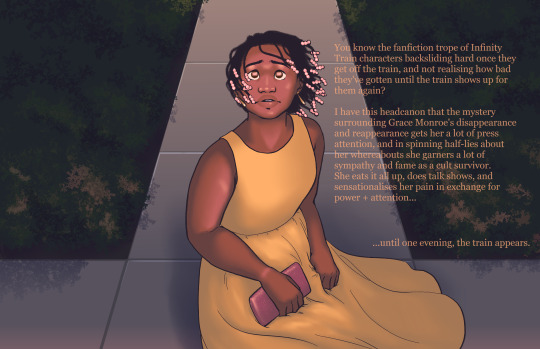
my vision for post-train grace monroe. love u 4ever bbg
bonus:

#grace monroe#infinity train#cult of the conductor#jesse cosay#lake infinity train#thunder's art#described#why is the third drawing rendered like im 12 yrs old discovering the blend brush for the first time ever? i dont wanna talk about it#im going through something#who wants to talk about the way grace is styled in the third drawing instead okay lets do it#first off. earrings. protective hairstyle. glittery purple clutch. these are things that denote grace's personality & preferences honestly#but then theres the beads at the end of the braids. and the yellow sundress.#these are things that denote youth and innocence#now cast your minds back to the debutante ball episode. that is the turning point in both simon and grace's arcs.#theyre newly 18. theyre adults. theyre an age where they ought to take responisbility and decide who they want to be in life#grace chooses (at length) to take responsibility but it takes a lot of work for her#when shes doing her talk shows shes regressing emotionally and so she wants to present herself as innocent and garner sympathy#hence the styling to make her look sweet and youthful#yeah. anyway
450 notes
·
View notes
Text
Once more, I do not post links directly leading to any blogs that are not from my mutual friends and followers regarding meta, anon, but I will break this down.
In cultural context, it is not meant to be romantic regarding the idiom of (青梅竹馬) qīng méi zhú mǎ. Literal meaning, green plums and play horses. The innocence of youth and the wonder of simple (childhood friend) games. Please note that endearments such as "sweet heart" in modern context, as the direct translation means, is vastly different than what is entailed by the idiom itself, and is bad, awful machine translation that does not take into account the linguistic meanings that are needed for tone meaning and reading.
If it meant the direct romantic connotation of romantic, it would be 恋人 (liàn rén) compared to the character used within the idiom 青 (qíng) (which does denote a more platonic meaning for the relationship and childhood friends). You do not use this to mean "lovers" as an idiom, it loses contextual meaning otherwise and loses the point of the word play.
The poem itself was originally a romantic poem, by Li Bai. And as such should be one of most well known Chinese poets and usual literary fair elementary students know as much as the West would with the usual school fare of reading assignments.
妾髮初覆額
折花門前劇
郎騎竹馬來
遶床弄青梅
同居長干里
兩小無嫌猜
十四為君婦
羞顏未嘗開
低頭向暗壁
千喚不一回
十五始展眉
願同塵與灰
常存抱柱信
豈上望夫臺
十六君遠行
瞿塘灩澦堆
五月不可觸
猿聲天上哀
門前遲行跡
一一生綠苔
苔深不能掃
落葉秋風早
八月蝴蝶黃
雙飛西園草
感此傷妾心
坐愁紅顏老
早晚下三巴
預將書報家
相迎不道遠
直至長風沙
My hair had hardly covered my forehead.
I was picking flowers,playing by my door,
When you, on a bamboo horse,
Came trotting in circles, throwing green plums.
We lived near together on a lane in Channggan,
Both of us young and happy-hearted.
...At fourteen I became your wife,
So bashful that I dared not smile,
And I lowered my head toward a dark corner
And would not turn to your thousand calls;
But at fifteen I straightened my brows and laughed,
Learning that no dust could ever seal our love,
That even unto death I would await you by my post
And would never lose heart in the tower of silent watching.
...Then when I was sixteen, you left on a long journey
Through the Gorges of Changgan, of rock and whirling water.
And then came the Fifth-month, more than I could bear,
And I tried to hear the monkeys in your lofty far-off sky.
Your footprints by our door, where I had watched you go,
Were hidden, every one of them, under green moss,
Hidden under moss too deep to sweep away.
And the first autumn wind added fallen leaves.
And now, in the Eighth-month, yellowing butterflies
Hover, two by two, in our west-garden grasses
And, because of all this, my heart is breaking
And I fear for my bright cheeks, lest they fade.
...Oh, at last, when you return through the three Pa districts,
Send me a message to home you come
And I will come and meet you and pay no mind to the distance,
All the way to Changgan.
I hope in comparison the vast sarcasm of the idiom is apparent in context to what the random nameless gossiper is exhibiting in the original reference this sentence used:
江澄居然就让这厮嚣张了这么久,换了是我,当初魏某人叛逃时就不是只捅他一刀,而是直接清理门户,否则他也没机会做出后来那些丧心病狂之事。对这种人,还讲什么同门同修青梅竹马的情面。
Translation (mine, seven seas and ExR:)
1: Jiang Cheng allowed that servant to live for too long. If I were him, when he defected, I wouldn’t have just stabbed him, I would have thoroughly wiped him out so he couldn’t commit his deranged acts later. Who cares about the sentiments about childhood friendship when people like him don’t care.”
2:
“I can’t believe Jiang Cheng allowed that guy to run amok for so long. If it were me, I wouldn’t have just stabbed him when he first defected, I would’ve cleaned house! He wouldn’t even have gotten the chance to do all those crazy things. What does a childhood friendship matter when facing people like him?”
3:
Jiang Cheng allowed this fellow to live for too long. If I were him, at the time of the defection, I wouldn’t have just stabbed him. In fact, I would have thoroughly examined the disciples of the clan again, so that he doesn’t do those crazy things he did later on. Who cares about the so called ‘considerations’ that he gave to his childhood friend.”
Now, with the idea that while the original meaning was meant to be sweet and sentimental, the idiom is certainly not any longer nor is the meaning to mean lover literally. Mandarin plays heavy upon the context of meaning for each of these words.
In short: this is why actual understanding of the language you are lecturing of is important as you can easily twist it to what is not there for ones that literally do not know and take it all at face value.
#mdzs#mo dao zu shi#putting meaning to an author's words that is non existent#literally#nothing annoys me more than claiming something that it's not
31 notes
·
View notes
Text




Age, physical appearance, and abilities are the key distinctions between geisha (geiko) and maiko.
Maiko typically looks younger than 20 and has poor conversational abilities. She also wears a more vibrant kimono with a red collar. Maiko, which is Japanese for "dancing child," refers to aspiring geisha. For a period of five years, Maiko must reside with their mother (okami-san) in the geisha lodging house (okiya). Maiko is not permitted to possess a cell phone, carry cash, or date.
What is a Maiko?
Maiko are the trainee geisha who are still honing their cultural and performance abilities. Maiko's attire draws extra attention in order to hide her inexperience and lack of understanding. Geisha attire is typically more sophisticated and understated. Maiko is forced to live with her "mother" and is solely dependent on the meager stipend she is given by the geisha house. In contrast, geisha are more self-sufficient and have their own home in the geisha communities. The pictures below show how you can tell a geisha from a maiko without any effort.
What does a geiko (geisha) do?
Professional performers of ancient Japanese arts and crafts such shamisen playing, dancing, and tea ceremony, geisha are members of recognized geisha groups. In the Kyoto dialect, geisha are referred to as geiko. "Geisha (geigi or geiko) is a traditional Japanese female entertainer, whose skills encompass many arts like dancing, singing, and playing music," according to Broma-Smenda (2014). In contrast to courtesans (yujô), geishas were exclusively trained in traditional Japanese arts and served as men's dinner companions.
The definitions of Maiko and Geisha
Gei-sha is a term for an artist, and mai-ko is a term for a dancer. Performing arts are what the word gei in gei-sha and gei-ko refers to. In this context, sha and ko essentially imply the same thing: a person. Japanese for "dancing" is mai, and -ko here denotes a young person.
Communication abilities
Maiko would generally say less and nod or smile more during a conversation because she is still in training. Geiko, on the other hand, is a master at starting and keeping up a conversation in any setting. Geisha would be aware of the kinds of talks that help their clients feel peaceful, at ease, or joyful.
cultural knowledge
Maiko would often go to the dance school and perfect her shamisen playing while there. Geiko is a skilled dancer, shamisen player, and tea ceremony expert. Geisha dance to various themes and music practically every month as the seasons and festivals change, which is why the training takes so long. Each geisha neighborhood in Kyoto has its own unique musical instrument and tea ceremonial traditions. Therefore, it is untrue that all geisha were proficient musicians.
Age
The geiko is over the age of 20, whereas Maiko is between the ages of 15 and 20. In the past, young girls were sold to okiya at the age of 7, but because this is now prohibited in Japan, many girls join the okiya after completing junior high school, which is the minimum level of education required by law. Despite the fact that the maiko stage might occasionally span 7-8 years, the usual maiko training lasts 3 to 5 years. Therefore, maiko who are older than 20 years old do exist in Kyoto. Readers should be aware that maiko are unique to Kyoto; the maiko-stage does not exist in the other geisha districts.
The attire worn by maiko today still shows signs of the young females who formerly were. For instance, maiko typically wear a sash with a large depiction of the okiya's emblem. Due to the fact that these young girls used to become lost and that people could identify the crest to return them to their homes, the mark is very large.
Appearance
Geiko typically have mature, refined appearances that are straightforward, attractive, and polished. Maiko expresses her youth and innocence in her vivid, vibrant clothing.
Face covered in white powder
Contrary to popular opinion, neither geiko nor maiko always wear white makeup, but when they do, there are variations. Maiko has a small gap between her hairline and her white-powdered skin, whereas Geiko would have a fully white face. Geiko and Maiko wore white makeup so that they could be seen clearly in the dark as there was no electricity in the past.
Lips
While Maiko, particularly Junior Maiko, only tints the lower lip crimson, Geiko colors both of her lips red. Maiko's lip makeup varies between the senior and junior versions.
eyelids that are flaming
Maiko have a recognizable red eye makeup, however geiko's redness is less prominent. The red eye makeup is frequently associated with the kabuki tradition, which frequently uses white, crimson, and black colors to stand out to viewers who may be seated far away.
rosy blush
Unlike the geiko, the maiko have pink blush on their cheeks. Maiko is supposed to always appear innocent and childlike.
Wig
Maiko has no wig on. They are need to style their own hair, which takes time and money. Maiko frequently spend the night sleeping on a piece of wood (takamakura) to preserve their hairdo. Geiko wears wigs because aging makes hair a little oily, which is hard to maintain, and style typically causes damage to hair over time.
Hair styles
The hairdo is one of the greatest distinctions between a maiko and geiko. Maiko have the wareshinobu hairdo, which is shown in the drawings, while the geiko have the shimada haircut. The hairdos of senior and junior Maiko differ. Maiko wear monthly-changing, brightly colored hair accessories with floral themes. The only hair accessory Geiko wears is a straightforward comb.
Hairpins
Maiko sports bira, which are silver, dangling metal hairpins. Geiko typically wears no hairpins or just uses very basic ones.
Kimono
Maiko dress in a vibrant, typically flower-decorated kimono with long sleeves, as seen in the pictures, while geiko dress in a straightforward kimono with short sleeves. Maiko and geiko wear separate inner garments, as was already mentioned. Typically, the chest of the maiko is suppressed to highlight her youth and purity. Maiko and Geiko both dress in pricey, custom-made silk kimonos, which are never found in shops.
The color of the collars worn by maiko and geiko is one of their primary distinctions. Geiko wears a white collar, while Maiko wears a red collar. Because of this, when a maiko transitions to a career as a geiko, they refer to it as "turning the collar."
Sash (Obi)
A 5–7 meter long silk sash is worn by Maiko. Geiko dons a straightforward, short sash. In the winter, Maiko's outfit—with the long sash, the intricate undergarments, and the jacket—can weigh up to 15 kilograms.
Sandals
Maiko wears okobo, which are tall sandals, while geiko wears zori, which are little sandals. Maiko typically wears sandals with a bell that jingles while she walks. Despite the fact that the sounds of these tiny bells may make them appear infantile, the locals refer to this sound as the sound of Kyoto streets.
How can you turn into a geisha?
The first stage in becoming a geisha is to apply to and be accepted into an okiya, where one can receive maiko training before becoming a geisha. However, it is still possible, just not typical, for foreigners to be accepted for training. Geisha are traditionally women of Japanese descent.
How do Geishas sleep?
To keep their haircut, Maiko was frequently taught to use a takamura as a pillow when they slept. Despite the fact that geiko or geisha would occasionally do the same, some choose to wear wigs because the haircut frequently wears down natural hair over time.
How can a Geisha be hired?
There are numerous opportunities to interact with geishas in Kyoto, particularly at the Kyoto Maikoya Tea Ceremony, where guests can watch geikos or maikos perform. Other opportunities include online meetings and in-person private sessions.
Why do geisha wear white makeup and have black teeth?
Geiko and Maiko wore white makeup so that they could be seen clearly in the dark as there was no electricity in the past. The black teeth, or "Ohaguro," are a custom used to indicate that a person has reached adulthood and provide a beautiful contrast to the white cosmetics. Although it is no longer done, certain geishas in Kyoto used to color their teeth.
In Japan, are geishas revered?
Geishas are highly regarded as entertainers and artists in Japan; becoming one is a lengthy and challenging process, particularly in Kyoto where the traditions are rigidly upheld
37 notes
·
View notes
Text
My Year in Review (Webtoons)
Idk if Webtoon is going to give us a year in review this year or not, but I’m making my own! I don’t talk nearly enough about the other webtoons I’ve read/been reading, so I’m going to use this as an opportunity to at least name them all and talk about why I enjoy them. Who knows - maybe some of my followers/mutuals are also reading what I am and want to gush!
Frankly, I cannot really rank things because I’m wishy washy and terrible at listing favorites, so this will be in no particular order. Read what I have to say about it, rather than where I ranked it, haha.
I attempted to limit the number of webtoons I fastpassed on but... uh. I wasn’t good at it. Sometimes I just did it all in one go, sometimes it’s a steady, every single week deal. These such webtoons are denoted with an F. I’m not gonna say me fast passing means it’s a favorite, because sometimes I end up fast passing because I just REALLY want to see what happens next, so... don’t assume it means it’s the best of the best lol.
Sometimes I get SO into a webtoon that when I hit all of what I can read in English, I’ll go look it up in Korean and try to read THAT lol. I’m not totally good at it yet but it serves as really good Korean practice so I’ll keep it up. These such webtoons are denoted with a K.
Let’s dive in!
I Love Yoo (F) Drama
I’m putting this first because that’s what a lot of people follow me for, and that’s where it deserves. I haven’t dedicated this much time and energy to many fandoms in the last 5 years, and ILY just reigns supreme there. Honestly, it’s exactly what I want out of a character-driven story that explores the complexities of our experiences. I understand why people want more out of it or aren’t fans of the slower pace, but that’s them, not me, and I LOVE it. Without fail, I fast pass this one so I can barf out all my thoughts on reddit and then yell some more over here. I love grey characters, I love complex characters, I love sad characters. Everyone does it for me, I stay winning!
How to Become a Dragon (F) (K) Fantasy
Lol I say I try to read this one in Korean but lol this one is WAY out of my league. Eon is a creator I already ADORED from Super Secret, so when HTBaD dropped, I was so excited. I’ve been reading it ever since and it’s been a steady Fast Pass for me. Bari is just... absolutely endearing and the whole of the story is fantastic. There’s a lot of hurt in the past to uncover, a lot of character development to witness, and so much fantastic lore. Admittedly the translations can sometimes be a little difficult, but that hasn’t been a very common occurrence. I say I don’t play favorites but if I did, this would be up there. Genre-wise it’s very much a fantasy, very light on the romance. PLEASE I beg of you guys, go read this and fall for Bari’s adorable Imoogi form!
Seasons of Blossom (F) (K) Drama, Romance
You wanna know how much I absolutely love this one? I bough physical, Korean copies! Seasons of Blossom is separated into four stories (one for each season, beginning with spring) that all weave together through the characters involved. Spring is sweet and innocent and subverts a few tropes in a fun way. Summer is oppressive and overbearing and I sobbed so much. Full disclosure, summer follows two characters still dealing with the suicide of someone five years prior. Fall is, ironically, a time for starting over, for turning a new leaf, as a character who was bullied in her youth tries to get revenge. I haven’t started winter yet... I’m bad at endings and I’m sad that this will soon be over and I’ll probably binge and catch up on it really soon lol. I genuinely, ardently love this one SO much. Please! It’s beautiful, it’s wonderful, my heart ACHES so much. It’s perfect!
Romance 101 (F) Romance
The only reason I haven’t read Romance 101 in Korean is because it’s complete and I need to pay to do that and I still haven’t figured out if there’s a way I can actually pay for it lol. It’s one I’ve been considering buying in Korean, though, so... yknow. Romance 101 is SO well done, and I’m obsessed with the art. All of the main characters are so wonderful and endearing, and Bareum makes a delightful main character, a university student who has never made room in her life for love and is thus sorely inexperienced and also sits on the cusp of true adulthood. There’s a love triangle that will tug at your heart, and so many WONDERFUL demonstrations of friendship! That’s something I appreciate a lot - a romance that isn’t about just the romance and acknowledges the importance of platonic love as well.
See You in my 19th Life (F) (K) Drama, Romance [completed]
I can understand why people have been put off by the “age gap” in this story - when you’re a person who has remembered every single life you’ve lived, you are mature beyond anyone you’ll ever meet. But despite that, I was really, really sucked into this one and absolutely read ahead in the Korean version lol. There’s just something about Jieum that I love so much, and the way the story connects everyone, but most importantly, how much Seoha means to her. There’s also some fantastic family relationships, and character growth that’s fun to watch. Idk I love this one and I felt SO sad when it ended! The spin off stories were sweet additions, though! Everything tied up so nicely I’m not so much left wanting more as much as just knowing I will miss this ensemble cast for months to come.
Act Like You Love Me (F) Romance
God, this is one hell of a love song to tropes and cliches, and I say that in a really positive way and mean it! The writing absolutely knows it’s making use of many tropes and is just haven’t unabashed fun being what it is. There’s boss/employee, cohabitation, bouts of fake dating, a love triangle, a touch of fantasy ? Idk this one is so fun to me and I remember feeling really bummed when it had a short hiatus lol. I’m not currently fast passing but I know I will when I’m ready to binge. Like, look the premise is just SO fun - possessing a plushie you can use to make a famous actor do anything you want? Famous actor and normal person falling for each other? It’s just GOOD FUN!
Odd Girl Out (F) Drama, Romance
This is another one that I fast-pass off and on. Full disclosure, I much preferred the first season of this story to the current one, but mostly because the first had so much wonderful friendships between the girls. The second season has a lot more focus on Nari’s romances and love triangle and I just don’t currently feel compelled to fast pass but we’ll see when it changes. Don’t get me wrong, I love good romances, but I ALSO am a sucker for wonderful girl friendships. Regardless, it’s a cute coming of age story and the plucky lead is neither meek nor dull, and the running theme of people being drawn to her for the colorful, wonderful person she is continues throughout!
Our Secret Alliance (F) (K) Romance
God, this is my catnip. Childhood friends to almost strangers to lovers? Fake dating? Really cute art? Man this is IT! Is the story terribly deep? No. Are the characters wildly complex? Also no. But sometimes I just want to enjoy a sweet, saccharine story filled with really pretty art, and this scratches that exact itch. It feels like it’s coming to an end and I find myself more sad that I expected to be about it. It’s just so endearingly cute to me and I’m gong to miss it when it’s completed!
She’s Hopeless (F) (K) Drama, Romance
From the creator of Orange Marmalade comes this story about a high schooler hired to be a chaebol heiress’s secret bodyguard. The catch? Said heiress has a nasty, nasty temper, and it’s his job to try to get her to get along with her classmates and shed her prickly exterior. This is one that I read off and on, catch up on and binge when the mood strikes. I do enjoy me a terrible female character sometimes when her motives are good and her personality is complex and this one does it SO well. It has a nice touch of enemies to lovers lite and some forbidden romance for those who dig that lol.
Wished You Were Dead (F) (K) Drama, Romance
Man a lot of people dislike this or find it too drawn out but idk I don’t share that sentiment with them. I guess it depends on your patience and what you enjoy lol. Arranged marriage where Emperor Karloi is betrothed to the daughter of his enemy and his Empress wife, Evonne, is actually the child who saved his life many years ago. But she can’t tell him that, because she’s forced to live a lie to keep her mother safe, and a magic spell prohibits her from even attempting to reveal her identity. As you can imagine, it’s created incredibly frustrating situations where poor Evonne, who is really Rue, endures hardship after hardship, while Karloi is unaware that the person who he is so cruel to is the person who sought out his whole life. HEAVY enemies to lovers, like I mean HEAVY. A lot of people are frustrated that Karloi hasn’t figured out Evonne’s identity despite him having nothing but a nagging sense that she reminds him of Rue. It’s one hell of a slow burn and I, for one, enjoy it (though honestly I’m like is this even gonna HAVE a happy ending or is this man gonna die miserable....)
Rewriting the Villainess (F) (K) Drama, Romance
I know isekai is really overdone but I never read them lol so this is fresh yet to me. Liza has returned from war only to find her one true love, her fiance, Illian has fallen for the princess of the very kingdom she went to war against. Hearbroken and anguished, she drowns her sorrows in alcohol only to wake up in the modern world, where she finds not only is she a character in an incomplete story written by Doeun, but she now occupies Doeun’s body. And even worse, she finds out she was not the protagonist of the story but, in fact, the villain. Angered by the way the writer planned to complete the story, she intends to ruin the author’s life as she lives it, until the day they can switch back to their respective places but... well, that doesn’t go according to plan. Honestly this one is SO fun and there’s a lot of mystery to unravel about Doeun and how they ended up in this place at all. There’s also some incredibly WONDERFUL exploration in different kinds of loves, and how familial love vs friendship love vs romantic love all differ from each other, which is something I’ve GREATLY enjoyed. The relationship between Liza and Illian is not a very healthy one, which is something she needs to learn for herself, and boy is she loving. It’s DELIGHTFUL, I’m having so much fun with this one! I tried not to fast pass it so I could save my coins but I couldn’t help myself ;~;
Daytime Star
Remember my love for saccharine little romances? This one fits the bill! It’s sweet and pretty and not terribly complex but I still find myself having fun and enjoying the story. The art is SOOOO pretty like WOW so pretty! There’s a part of me that wants to fast pass because I do enjoy it but I’m saving it for now! Besides the romance side of things, it’s just really fun watching Yura, a struggling actress, finally get noticed and start to make a name of herself in the acting world, and ngl that’s probably the thing that keeps this from being a story that fades into the nether. I don’t say that in a bad way, either!
Beyond Virtual Drama Romance [Hiatus]
Full disclosure, this one has been on hiatus for most of the year and I DON’T KNOW WHEN IT’S COMING BACK. There’s not even a Korean version of this?! Even though it’s DEFINITELY a Korean webtoon?! PLEASE I need my fix! I really, really dig this one and I didn’t expect to enjoy it as much as I wound up! It takes place in a near distant future where the world has fallen into further ruin due to climate change and pollution, where people turned to VR to escape the misery of the real world. In VR they can see flowers where there are none, blue skies, animals that have gone extinct, and live the lavish lives they will never have in reality. They can also participate in events with virtual reality idols, who can beat out any human any day. Sora is one such high schooler who is content to live out her fantasies in VR and go on dates with her idol bias. Her best friend, though, has other ideas, and rejects the world of VR. He’d rather be a real human, in the real world. There’s actually lol a LOT of parallels in Beyond Virtual and I really love the story being woven, and the war against VR, the fight to turn to the real world and appreciate what is tangible and real. Okay, I ALSO enjoy the friends to lovers, so sue me!
Operation True Love (F) (K) Romance, Drama
Listen. I started this like, last Friday. lmao I JUST started it and I’ve devoured it completely, which isn’t a surprise, but I’m also fast passing it AND have started to read it in Korean AND I’m already feeling itchy for more lol. Suae knows her boyfriend is scum, but she can’t help that she’s still into him. But everything in her life goes sideways when a pink Jellypop phone appears in her locker. It’s not just any phone - it can show the amount of love that anyone will receive in life as well as how much life they’ve already received. And Suae? She’s 0/0. She’s got to convince the creator that she’s not a bug in the system and that she can defy the rules and change her 0 into a 1. And look, if she has to do it by using her scummy boyfriend’s best friend, then so be it. After all, she’s already found out there’s a lot more going on with him and her adopted sister than she thought. AND LISTEN I LOVE IT. I love it SO much. The art is so good, it reminds me a little of I Love Yoo but also maybe a touch of Daytime Star? Suae is WONDERFUL and I absolutely LOVE her antics with Eunhyeok. Raim makes for a really complex, if not awful lol, antagonist and I’m really looking forward to seeing how things play out. Look I’m all caught up with this thing and the Korean version is only one!!!! episode ahead of the English FP what the heck am I to do?! (I translated it. lmao this is my Korean practice now, translating the Korean episode.)
When the Day Comes Drama Romance [Complete]
The creator, OMOYO, is up there with eon in that when I first started using webtoon, I binged their webtoons. The Story of Those Around Us was fantastic and I really enjoyed OMOYO’s art a lot, so when I finally got started on When the Day Comes, I knew I would be utterly charmed. And I absolutely was! OMOYO has a wonderful kind of humor and even more importantly, presents stories in a really candid way. Ngl this one really tugged at my heart in MANY ways - like I found myself having a sweet little mournful cry one night lol. It’s just. Idk delightful, really well done. I look forward to whatever OMOYO works on next!
Rumor Has It Romance Drama [Complete]
I don’t really like daily pass webtoons because I’m bad at keeping up with them. I can’t even remember how I started reading THIS one. Boredom and need to read something, probably? It’s very up there in saccharine, sweet little stories, and follows two exes who end up as neighbors as they enter college. It’s a really fluffy story, not incredibly deep, and is a generally fun read!
No Longer a Heroine Drama Romance [Complete]
I don’t use the term guilty pleasure, but I guess if I did, this would probably be considered one. In some ways, this story is really makjang - it just goes OUT there and there are things in it that genuinely made me go “oh shit I didn’t see that coming”! It’s also very much up there with complex, unlikable female leads. I know the art isn’t very pretty, but if this was a drama, people would eat it up solely FOR the drama. I can’t say a lot without spoiling it but I genuinely like where they went with the romance, I didn’t expect it but it was exactly what I’d hoped for!
Back to You Drama Romance [Complete]
Full disclosure, this is now a daily pass and I have not finished this one lol. I can’t say why exactly - I guess I kind had a feeling of where the story is going? I think maybe I could have enjoyed it more WITHOUT the romance, actually? That’s the element I wasn’t here for. The idea of going back in time to change the past, to save a person you deeply cared about? Love that. The idea of messing with time and being messed up back? SO good. The irresistible urge to create big ripples and alter the entire timeline? YESSSSS. But meh @ all the romance that happened, I guess? lol Now that it’s a daily pass idk if I’ll ever finish it? I peeked at the ending when it completed, though! I think if this were a drama, I’d probably have quit it, too, because there were some things that were just too frustrating for me to deal with lol. But it may be someone else’s cup of tea!
The Star Seekers
LMAO look I don’t expect most of my followers to read or take interest in it but as a fan of TXT lmaooo I am. It’s cute, it’s fun, I like fast passing it, Viken is an ADORABLE rendition of Beomgyu, I’m really into the Star Seekers universe and was hoping this would give me insight to the MV storylines. IT DOESN’T! But I’m still having fun lmaoooooooo
Special shout out to Super Secret, which is now a daily pass, that I reread again because I will never tire of it. It’s so fluffy and sweet and I just love it. I also have already reread Beyond Virtual because it’s been SO LONG SINCE IT UPDATED PLEASE BRING IT BACK
Everything else that follows is stuff I have begun but maybe haven’t gone back to or just go back every so often to catch up on!
Honey Lemon
My Reason to Die
Maybe Meant to Be
Sunny and Rainy
Our House
Our Time
Vampire Husband
Unfamiliar
Our Beloved Summer
Your Letter
Heavenly Eats
Your Smile is a Trap
Seven Years Later
Exchange Student
Spring Once Again
And here are things I started and dropped!
To You Who Swallowed a Star (I cannot overstate how MUCH I could NOT stand this afljkafjkajkfkjafjkafkaljajkf)
A Summer Night’s Dream
To Love Your Enemy
I guess Back to You?
Superstar Associate Manager
There’s Love Hidden in Lies
What if Feels to Date You
Loaf App
To Love and Be Loved
One day I will properly start Purple Hyacinth and maybe I’ll get into my TBR list (and probably drop some lol)
#ashlie.txt#webtoons#feel free to roast me for my choices lmao#alternatively feel free to throw things at me you think i'll enjoy#like i am serious if you guys ever wanna talk about other webtoons besides ily pLS HIT ME UP OKAY#I JUST LIKE TO TALK ABOUT THE THINGS I READ!!!!!!!#sometimes i just wanna YELL about things#like how FUN Operation Love is oh my GOD i'm having fun#how CUTE and wonderfully done Romance 101 is!#SOMEONE PLS READ HOW TO BECOME A DRAGON PLSSSSSSSSS#if you wanna read wished you were dead and enjoy some angsty painful slowburn that frustrates others that would be cool LMAOOOOOOOOOOO#I Love Yoo#How to Become a Dragon#Seasons of Blossom#Romance 101#Operation True Love#See You in My 19th Life#Odd Girl Out#Act Like You Love Me#Our Secret Alliance#She's Hopeless#Wished You Were Dead#Rewriting the Villainess#Beyond Virtual#When the Day Comes#Rumor Has It#No Longer a Heroine#Star Seekers#not tagging what I dropped and the ones I don't read regularly huhuhu
30 notes
·
View notes
Text
You guys have got to stop drawing every baby with blue eyes.
Dark brown eyes are just as beautiful and innocent-looking.
My baby brother has deep brown eyes and he is the sweetest and purest thing, when I look into his eyes I fall in love.
Stop using blue eyes to denote innocence.
Stop using blue eyes to denote childhood or youthfulness.
13 notes
·
View notes
Text
The man who was reading "Invisible Women" on the train, the man with rings who I held the door open for, the “queer-baiter”, the guys who post on social media the Taylor Swift album, post-ironically, to score points with women.
In the fairytale, the prince would save the helpless princess, her softness and fragility which made her so beautiful becomes emphasized through the prince's journey climbing up her tower, or the princesses ability to talk to animals: her possession of some sort of enchanted magical joy so enticing to the prince that he must save her. Even though the prince possesses the superior physical form of strength, thus marking the understandings of power dynamics in a logical sense, the princess possesses a certain enchantment, something past logical human capabilities. Thus, in a post-modern world, men now understand the lack of depth the prince possesses, his power being in his braun and valor, while the princesses power is in being desired (however misogynistic that is). And men crave this capacity of innocence and magical quality of emotion and expression. This is alike how in The Beautiful and Damned, by F. Scott Fitzgerald (or if we are more historically accurate, Zelda Fitzgerald, which aids in my overall point), Anthony Patch and his lack of meaning In life, though he is not like the contemporary bachelor who paints his nails, becomes enamored with the elusive Gloria. Gloria, who is popular among the boys yet, has not had the right prince come and "save her". He is enchanted by her, to put it simply, her innocence and depth, and wins her over by force and coercion thus instead of a happy equal marriage, they suffer under each other. Anthony corrupts her innocent, youthful glow and joy and they both suffer an unhappy meaningless life. Anthony was already on the path to do so, he would've had to slay the dragon no matter what (that is the reality of a patriarchal world, and yes it does impact men which I am not ignorant of). Gloria though, now unhappy, was not predestined to such a reality, her suffering is do to Anthony's corruption.
My critique on men doing “feminine” things or breaking the barriers of gender casually in their style or commodities is not that I am against tearing down gender stereotypes, it is that men who proclaim to be the feminist type are not actually feminists at heart- it is impossible for a man to be a feminist, especially if he proclaims it loud and clear for everyone to see. My issue see here is that these men, who consume more typically “female” products, to break these stereotypes are doing so in effect to appeal to women, to say “hey I am one of the good ones”. They paint their nails and read Sylvia Plath because they’re “deep”. Thus we understand men who lack this sort of emotional capacity that women possess, subconsciously denote that this emotional intelligence is connotated with a "higher culture", a higher ability of depth which they do not possess and thus desire. *We all know women are smarter than men, and that is why we live in a patriarchal society.* No man can ever relate to the female experience, they only try and do so to further hide their patriarchal tendencies, to further dissolve the tangible realities of our world of male supremacy; the man guiding us drunken, fragile and helpless, women up the cold stairs of false progress and to the dark, locked bedroom of “mutual” hope for equality. These “signs” of femininity- painted nails, listening to and publicly adoring female artists, jewelry, long hair- have lost their meanings. If we are looking towards gender abolition, these "signs" are supposed to lose their binary meanings, yet this is not the programming of patriarchy and these items manufactured by our global village. Escape from the gender binary will never be as simple as consuming more items and media. These "signs" are revived by men who want to be softer, deeper, more intellectual, and quirky, double emphasizing the "meaning"(lessness) of these signs. Women are not born knowing to wear makeup, it is in their subjugation and control that makeup is marketed towards them, forced upon them, like any other traditional sign of womanhood. The soft boys, in their own efforts of blind superiority thus entice women in with their relatability, their likeness to femaleness which us girls are less threatened by, and thus they trap us like wild animals and kill the innocence, the joy we have. Interestingly, and a bit of a reach, but take this into consideration: this also facilitates a cycle, a cycle of which women romanticize melancholy girlhood due to their mistreatment by these manipulative men, and more culture forms around the female experience which men thus try and emulate further. (This loss of innocence, due to men and broken hearts, continues to allow the women to romanticize the loss of innocence and thus, fetishize it. A self destructive cycle specific to the female experience.) And so on, and so on. Until everything has lost significance and the boy with mommy issues is cradled by the bitch of his choosing.
How could a man ever relate to Syvia Plath's man-eater literature? I truly don't get it.
Ofcourse, there are men who this does not respond to so specifically. So I guess I am not talking about men in general, more of a certain type of guy I come across often who love the feeling of superiority from their masculinity, yet also long to relate to the "sad girl" trope, thus this broken fictional man entices the girl to "save him". Oh and yes of course this is specifically my experience, some people are lesbians and that’s okay. LOL.
also these hashtags I included are more ironic than supposed to be like for their intended purpose
5 notes
·
View notes
Text
This track is originally from the TOS episode Shore Leave and it honestly brings me to tears. It’s first used in the scene between Kirk and a facsimile of Ruth, a college sweetheart.

She’s just a creation pulled from Kirk’s mind by the aliens who live on that planet but he is enraptured by the encounter nonetheless.
What I find so beautiful about the score is how much emotion it conveys. It starts out so sweet and tender and you can really feel the innocent love that they had for each other.
Then we get into the painful but bittersweet emotions that come with separation. To me the score and their acting shows that things didn’t end poorly between them and it also wasn’t necessarily their choice to break up. I like to think that this was one of the moments Kirk chose his career or education over personal relationships and maybe Ruth did too.
Things that can never be but the longing for them anyway. But also the acknowledgement that things that were sweet and tender but didn’t last still have meaning. Accepting that the choices made were for the best.
And then back to that sweet innocent love. This planet giving them a chance to relive that moment from their youth.
Just a truly beautiful score. It’s used in other episodes to denote a romantic mood but to a much lesser effect in my opinion.
I love this episode for many goofy reasons but also because of the insight we get into Kirk and his past. I personally don’t buy into him being a player but that could be a whole other post. Here we see him with someone he loved deeply and I’d posit innocently. He even says he almost married her!
2 notes
·
View notes
Note
Hello i would like help with constructing a sexual themed tarot question if you agree !
First of all i have no intention of starting anything with this person its just for fun and we are close enough to joke about those things
Are they attracted to me ? - High Priestess
What are their sexual fantasizes about me ?
- page of cups : maybe it is about worshipping ? I have someone who admires who comes to mind
- 7 of pentacles - "visions" so voyeurism and then this reward/gain dynamic maybe wanting me to work for it
- 4 of cups - ??? A lot happens on their mind ? Maybe they like fantasizing or want me to fantisize ? OR they like mind plays with teasing and all like yearning
Could i have your opinion please ?
Thank you !
Hello!
I'm always happy to hear about people having fun relationships so let's get into this.
Before I say something, obviously I don't know specific details here so take my opinions as mere suggestions.
High Priestess in this context might mean that you and that person have a little crush on each other, or they have a little crush on you but it's in a way latent one. Like... unless you initiate it, they are not likely to act upon it, nor feel the urge to do so. It's not like they were sweating not to confess to you, it's not such a strong crush. They might have a soft spot for you. It's like... you two are friends and while they might find you attractive in many ways, they value the friendship so much they would never put it at risk. Also, I suggest to avoid the yes/no question next time.
Page of Cups is one of the more innocent pages, they might have some more soft type of fantasies about you. Something more about emotional connection rather than physical attraction. It can be like admiration, praises, compliments, playful flirting. Page is youthful and curious but not really focused on some particular result so I don't think they have any type of physical action on their mind. Just flirting and having fun, making you feel happy and cheering for you, making you feel confident about yourself.
7 of Pentacles can mean like longterm development, devotion, cherishing the time spent together, valueing your company. It can denote they actually count on you for a long haul be it in a romantic or platonic sense. I feel like... they might feel like they are helping you to grow as a person while you help them to grow, too. You become better people together, you motivate each other to be the best versions of yourself. It nearly gives like older sibling kinda vibes but with a friend who you know for a long time and they feel protective of you and might even have tender feelings for you but their main goal is to keep you safe and happy.
4 of Cups can point towards their feeling of being blessed by knowing you. Maybe they never imagined before how good it could feel to know you, to be close with you. It could mean they truly find you important in their life, on emotional level, too. You are their happy pill, the person they turn to when they need a little love in life but not in a sexual sense, more like the kind of unconditional love where you don't have to ask, you just see the expression on their face and hug them because you know that's what they need at the moment.
I know I have stirred away from the NSFW theme but the High Priestess in combination with the other cards kinda gave this more SFW vibe. Even when you ask about NSFW topic, you can get a wholesome answer so... this was an example of that. At least my interpretation. 😂 Obviously, I have no idea who this person is and what's your relationship with them so I can be sooo wrong about all this. But you asked about my opinion and here it is 😊
0 notes
Text
“...On June 26, ad 4, Augustus adopted Tiberius. Livia’s son, forty-four years old, now became officially the son of her second husband. Henceforth he is called Tiberius Julius Caesar and is clearly the man designated to succeed the emperor. As he had in the past, Augustus made provision for the possibility that Tiberius might not necessarily survive him. Agrippa Postumus had not given any evidence of being temperamentally suited for high office, but Augustus perhaps hoped that in the general way of things an unruly youth could mature into a responsible adult. Hence the emperor adopted Postumus on the same occasion.
Moreover, Tiberius was obliged, before his own adoption, to adopt his nephew Germanicus, who would thereby become Tiberius’ son and would legally have the same relationship to Tiberius as his natural son, Drusus. The marriage of Germanicus and Agrippina followed soon after, probably in the next year. There is no reason why the unconcealed manoeuvring on behalf of Germanicus should have upset Livia unnecessarily, despite the clear implications of Tacitus that it did. Germanicus, after all, was her grandson as much as was Drusus Caesar. The arrangement reinforced rather than weakened the likelihood of succession from her own line, as was to be demonstrated by events.
The marriage would prove extremely fruitful. In time Agrippina bore Germanicus nine children, six of whom survived infancy. The first three were sons, great-grandsons of Livia: Nero, the eldest (not to be confused with his nephew Nero, the future emperor); Drusus (to be distinguished from the two more famous men of the same name: Drusus, son of Livia, and Drusus Caesar, son of Tiberius); and Gaius (destined to become emperor, and known more familiarly as Caligula). She also bore three surviving daughters, Drusilla and Livilla, and, most important, the younger Agrippina, mother of Livia’s great-great-grandson, the emperor Nero. The adoption of Tiberius in ad 4 would have been an occasion of joy and satisfaction for Livia, and would have helped to efface any lingering grief that still afflicted her over Drusus’ death.
If we are to believe Velleius, not only Livia but the whole Roman world reacted jubilantly to the new turn of events. Needless to say, his account should be treated with due caution. There was, he claims, something for everyone. Parents felt heartened about the future of their children, husbands felt secure about their wives, even property owners anticipated profits from their investments! Everyone looked forward to an era of peace and good order. A colourful exaggeration, of course, but there probably was considerable relief among Romans that the succession issue seemed at long last to be settled.
…In the immediate aftermath of the adoptions the ancient authors inevitably tend to focus on Tiberius and the campaigns he conducted in Germany and Illyricum, and they virtually ignore Agrippa Postumus, whose name was to be invoked later by sources hostile to Livia. A few details about Postumus emerge. In ad 5 he received the toga of manhood. The occasion was low-key, without any of the special honours granted Gaius and Lucius on the same occasion. It also seems to have been delayed. Postumus would have reached fourteen in ad 3, and under normal circumstances might reasonably have been expected to take the toga in that year. Something seems to be wrong. Augustus had certainly endured his share of problems with the young people in his own family. The pressures facing the younger relatives of any monarch are self evident, given the sense of importance that precedes achievement, to say nothing of the opportunists attracted to the immature and malleable, and prepared to pander to their self-importance.
As Velleius astutely remarks, magnae fortunae comes adest adulatio (sycophancy is the comrade of high position). These pressures must have been particularly intense in the period of the Augustan settlement, when no established standards had yet evolved for the royal children and grandchildren. Gaius and Lucius, the focus of Augustus’ ambitions and hopes, caused him endless grief by their behaviour in public, clearly egged on by their supporters, and on at least one occasion Augustus felt constrained to clip their wings. Gaius’ brave but distinctly foolhardy behaviour during the siege of Artagira is surely symptomatic of the same conceit.
There is no reason to assume that Postumus would have been immune from the pressures that turned the heads of his siblings. Whatever traits of haughtiness Postumus might have displayed in his early youth, they were not serious enough to have entered the record, and the exact nature of his personal and possibly mental problems is far from clear. The ancient sources speak of his brutish and violent behaviour. Some modern scholars have suggested that he might have been mad, but the language used of him seems to denote little more than an unmanageable temperament and antisocial tendencies.
For whatever reasons, eventually Augustus decided to remove him from the scene. The details of this expulsion are obscure. Suetonius provides the clearest statement, recording that Augustus removed Postumus (abdicavit) because of his wild character and sent him to Surrentum (Sorrento). The historian notes that Postumus grew less and less manageable and so was then sent to Planasia, a low-lying desolate island about sixteen kilometres south of Elba. Tacitus has no doubt about where the ultimate responsibility for Augustus’ actions lay. Postumus had committed no crime.
But Livia had so ensnared her elderly husband (senem Augustum) that he was induced to banish him to Planasia. Tacitus’ technique here is patent. The use of the word senem is meant to suggest that Augustus was by now senile, even though the event occurred eight years before his death. Incapable of making his own rational decisions, he would thus be at the mercy of a scheming woman, just as later Agrippina the Younger reputedly ‘‘captivated her uncle’’ Claudius (pellicit patruum). No reason is given for Livia’s supposed manoeuvre—which as usual, according to Tacitus, was conducted behind the scenes—except the standard charge that her hatred of Postumus was motivated by a stepmother’s loathing (novercalibus odiis).
Yet nothing in the rest of Tacitus’ narrative sustains his assertion, and the historian himself admits that the general view of Romans towards the end of Augustus’ reign was that Postumus was totally unsuited for the succession, because of both his youth and his generally insolent behaviour. Moreover, Augustus had made the strength of Tiberius’ position so patently evident that Livia would hardly have considered Postumus a serious candidate. This seems to be confirmed in a remarkable passage of Tacitus which uncharacteristically reports public reservations about a potential role for Germanicus, supposedly Tiberius’ rival.
After reporting the popular view that Postumus could be ruled out, Tacitus says that people grumbled that with the accession of Tiberius they would have to put up with Livia’s impotentia, and would have to obey two adulescentes (Germanicus and Drusus) who would oppress, then tear the state apart. Tacitus concedes that even the prospect of the reasonable Germanicus and Drusus being involved in state matters caused consternation. This surely offers some gauge of how far below the horizon Postumus was to be found. The precise reason for Postumus’ removal to Sorrento, if it was not simply his personality, is not clear. The initial expulsion may have been provoked by nothing more serious than personal tension between him and his adoptive father.
Whatever the initial reason, it soon became apparent that if Augustus had hoped that sending his adopted son out of Rome would solve the problem, he was mistaken. Dio places Postumus’ formal exile to Planasia in ad 7. If, as Suetonius claims, he was sent first to Sorrento, what might have precipitated the change in the location and the more grave status of his banishment? We have some hints in the sources. Dio suggests that one of the reasons for Augustus’ giving Germanicus preference over Postumus was that the latter spent most of his time fishing, and acquired the sobriquet of Neptune.
Now this could point simply to irresponsibility and indolence, but the picture of Postumus as an ancient Izaak Walton serenely casting his line does not fit well with the very strong tradition of someone wild and reckless. His activities may well have had a political dimension. The choice of the nickname Neptune could allude to the naval victories of his father, Marcus Agrippa. The fishing story might well belong to the period after Postumus’ relegation to Sorrento. This could have proved a risky spot to locate Postumus, because it lay just across the bay from the important naval base at Misenum that his father had established in 31 bc. The innocent fishing expeditions might have covered much more sinister activities.
Augustus may well have concluded eventually that Postumus was too dangerous to be left in the benign surroundings of Sorrento. During Postumus’ second, more serious phase of exile, on the island of Planasia, he was placed under a military guard, a good indication that he was considered genuinely dangerous rather than just a source of irritation and embarrassment. This final stage of banishment was a formal one, for Augustus confirmed the punishment by a senatorial decree and spoke in the Senate on the occasion about his adopted son’s depraved character. Formal banishment enacted by a decree of the Senate would be intended to make a serious political statement and should have buried completely any thoughts that Postumus might have been considered a serious candidate in the succession.
We cannot rule out the possibility that Postumus became involved, perhaps as a pawn, in some serious political intrigue, if not to oust Augustus then at the very least to ensure that he would be followed not by a son of Livia but by someone from the line of Julia. If Postumus was being encouraged to think of a possible role in the succession, it might reasonably be asked who was doing the urging. Although there is no explicit statement on the question in the sources, many scholars have accepted the notion that there existed a ‘‘Julian party,’’ responsible for much of the ‘‘anti-Claudian’’ propaganda directed against Livia and Tiberius that is found in Tacitus in particular and possibly derived from the memoirs of Agrippina.
…Whatever the intrigues in Rome, Livia’s son was able to keep himself aloof and to play the role that suited him best, that of soldier. Tiberius conducted a brilliant series of campaigns in Pannonia for which a triumph was voted in ad 9. (This was postponed when Tiberius was despatched to Germany in the aftermath of the disastrous defeat of Quinctilius Varus, in which three legions were lost.) When the Pannonian triumph was voted, Augustus made his intentions crystal clear. Various suggestions were put forward for honorific titles, such as Pannonicus, Invictus, and Pius.
The emperor, however, vetoed them all, declaring that Tiberius would have to be satisfied with the title that he would receive when he himself died. That title, of course, was Augustus. It also appears that a law was later passed to make his imperium equal to that of Augustus throughout the empire, and in early 13 his tribunician power was renewed. His son Drusus Caesar received his first accelerated promotion, designated to proceed directly to the consulship in ad 15, skipping the praetorship that should have preceded this higher office.
The virtual impregnability of Tiberius’ position should be borne in mind in any attempt to understand the final months of Augustus’ life. In the closing chapter of her husband’s principate, Livia reemerges in the record to play a central and, according to one tradition, decidedly sinister role. This is perhaps the most convoluted period of her career, where rumour and reality seem to diverge most widely. To place the events in a comprehensible context, it is necessary to note one later detail out of its chronological sequence. As we shall see, after Augustus’ death there was a rumour reported in some of the sources that Livia had murdered her husband.
In the best forensic tradition, a motive would have to be unearthed to make the charge plausible, especially since sceptics could hardly have failed to notice that Augustus had never enjoyed robust health and was already in his seventy-sixth year. Death from natural causes could hardly be considered remarkable under such circumstances. The requisite motive would indeed be produced, and the kernel of the intricate thesis that evolved is found in a brief summary of Augustus’ career by Pliny the Elder. Among the travails that afflicted the emperor, Pliny lists the abdicatio of Postumus after his adoption, Augustus’ regret after the relegation, the suspicion that a certain Fabius betrayed his secrets, and the intrigues of Livia and Tiberius.
Pliny’s summary observations are clearly based on a more detailed source, which suggested that Augustus felt some remorse about Postumus. This simple and not improbable notion is developed by other sources into a far more complex scenario that creates an apparently plausible motive, because it could be claimed that Livia would have wanted to remove her husband before he could act on his change of heart. This reconstruction of the events is clearly reminiscent of the closing days of the reign of Claudius, when the emperor supposedly sought a rapprochement with his son Britannicus, to the disadvantage of his stepson Nero, and thereby inspired his wife Agrippina to despatch him with the poisoned mushroom.
But it is important to bear in mind that as Pliny reports the events he limits himself to the claim that Augustus regretted Postumus’ exile, without further elaboration, and although Livia and her son supposedly engaged in intrigues of some unspecified nature, Pliny assigns no criminal action to either of them. Pliny’s ‘‘skeleton account’’ is to some degree validated by Plutarch. In his essay on ‘‘Talkativeness,’’ Plutarch, in a very garbled passage, relates that a friend of Augustus named ‘‘Fulvius’’ heard the emperor lamenting the woes that had befallen his house—the deaths of Gaius and Lucius and the exile of ‘‘Postumius’’ on some false charge—which had obliged him to pass on the succession to Tiberius. He now regretted what had happened and intended (bouleuomenos) to recall his surviving grandson from exile.
According to Plutarch’s account, Fulvius passed this information on to his wife, and she in turn passed it on to Livia, who took Augustus to task for his careless talk. The emperor made his displeasure known to Fulvius, and he and his wife in consequence committed suicide. This last detail was perhaps inspired by the famous story of Arria, who achieved immortal fame in ad 42 when she died with her husband Caecina Paetus, who had been implicated in a conspiracy against Claudius. Plutarch’s confused version of events does not inspire confidence, and in any case, although he gives Livia a more specific role than does Pliny, he follows Pliny in not attributing to Augustus any action, only supposed intentions.
Dio’s account is a much contracted one, but derived from a source that has added a very important wrinkle to the story and has Augustus taking action on his change of heart. Dio says that Livia was suspected of Augustus’ death. She was afraid, people say (hos phasi), because Augustus had secretly sailed to Planasia to see Postumus and seemed to be on the brink of seeking a reconciliation. This bald and surely implausible story, involving a round trip of some five hundred kilometres, is given its fullest treatment in Tacitus, clearly drawing on the same source as Dio.
He says that people thought that Livia had brought about Augustus’ final illness, because a rumour entered into circulation that the emperor had gone to Planasia to visit Postumus, accompanied by a small group of intimates, including Paullus Fabius Maximus. Fabius, clearly Plutarch’s ‘‘Fulvius,’’ was a literary figure of some renown, a close friend of Ovid and Horace. He was also an intimate of Augustus, consul in 11 bc, governor of Asia, and legatus in Spain (3–2 bc). He would thus be a plausible participant in this mysterious expedition. Tacitus reports that the tears and signs of affection were enough to raise the hopes of Postumus that there was a prospect of his being recalled. (It is striking that Tacitus is ambiguous about the meeting’s purpose and is too good a historian to bring himself to claim that Augustus had gone there to commit himself to Postumus’ rehabilitation.)
Fabius Maximus supposedly told the story to his wife, Marcia, and she in turn passed it to Livia. The text of the manuscript is corrupt at this point, but Tacitus seems to say that this indiscretion came to the knowledge of Augustus (reading the text as gnarum id Caesari). The subsequent death of Fabius, Tacitus says, may or may not have been suicide (the implication is that Augustus ordered it, as Plutarch suggests). Marcia was heard at the funeral reproaching herself as the cause of her husband’s downfall (this presumably is how the story got out).
After this detailed account Tacitus undercuts his own case when he goes on to say that Augustus died shortly afterwards, utcumque se ea res habuit. The force of this phrase is essentially ‘‘whatever the truth of the matter.’’ It hardly inspires conviction. The story of the adventurous journey to Planasia and the tearful reconciliation has generally been greeted with scepticism by modern scholars. Jameson is an exception. She uses the Arval record to argue that Augustus did take the trip, noting that on May 14 there was a meeting of the brethren for the cooption of Drusus Caesar, the son of Tiberius, into their order. Fabius Maximus and Augustus were absent from the ceremony, and submitted their votes, in favour of the co-option, by absentee ballot. But is there anything remarkable in their absence?
Clearly, the election of Tiberius’ son was not in reality a particularly important occasion, for Tiberius himself failed to attend. Moreover, Syme notes that no fewer than five other arvals were absent from this meeting, and that there could be a host of explanations for Augustus’ absence. Also, if the co-option was seen as an important family event, then it would surely have been the very worst time for Augustus to try to slip away unnoticed. The emperor was by this time in declining health, so weak that he even held audiences in the palace lying on a couch. In ad 12 he was so frail that he stopped his morning receptions for senators and asked their indulgence for his not joining them at public banquets.
Yet we are supposed to assume that he made the arduous journey to Planasia, and that he did so without Livia realizing what he was up to. It is also important to observe that both Tacitus and Dio drew on a source claiming that Augustus was on the verge of making amends with Postumus. An actual reconciliation seems to be ruled out by the later sequence of events. Certainly he did nothing whatsoever on his return to strengthen Postumus’ position or to weaken that of Tiberius. Finally, one might ask whether Augustus could ever have seriously considered recalling Postumus. He had put him under armed guard. There were plots to rescue him. His supporters published damaging letters about the emperor. It all seems implausible. Syme suggests that the details of the journey might have been added soon after Augustus’ death, a ‘‘specimen of that corroborative detail which is all too apparent (and useful) in historical fictions.’’ Syme bases his argument in part on aesthetic considerations. The episode as it appears in Tacitus is introduced in an inartistic fashion and appears to have been grafted on as an afterthought, introducing two names, those of Fabius Maximus and his wife, Marcia, that will not be mentioned again in the Annals. Moreover, neither Pliny nor Plutarch mentions Planasia.
…The plot described by Suetonius might then have been a last desperate effort to rescue her. In any case it seems to have come to nothing. In addition to the supposed political intrigues in the period immediately before Augustus’ death, there was no shortage of signs that the gods, too, were feeling distinctly uneasy, ranging from the usual comets and fires in the sky to more opaque portents, like a madman sitting on the chair dedicated to Julius Caesar and placing a crown on his own head, or an owl hooting on the roof of the Senate house. But Augustus seems to have had no premonition that he had little time left when he set out from Rome in August 14.
At that time Tiberius was obliged to leave the city for further service abroad, and he departed for Illyricum with a mandate to reorganise the province. Livia and Augustus joined him for the first part of the journey. This very public gesture is an affirmation of the emperor’s faith in Tiberius—a very odd signal to send if only a few months earlier he had become reconciled to Postumus and had changed his mind about who would succeed him. The party went as far as Astura, and from there followed the unusual course of taking a ship by night to catch the favourable breeze. On the sea journey Augustus contracted an illness, which began with diarrhoea.
They skirted the coast of Campania, spent four days in Augustus’ villa at Capri to allow him to relax and recuperate, then sailed into the Gulf of Puteoli, where they were given an extravagant welcome from the passengers and crew of a ship that had just sailed in from Alexandria. They passed over to Naples, although Augustus was still weak and his diarrhoea was recurring. He managed to muster up the strength to watch a gymnastic performance. Then they continued their journey. At Beneventum the company broke up. Tiberius headed east. As Augustus began the return journey with Livia from Beneventum, his illness took a turn for the worse. Perhaps he had a sense that his end was near, as he made for an old family estate, in nearby Nola, where his father, Octavius, had died.
Augustus was not to leave Nola alive. His condition quickly grew worse, and on August 19, 14, at the ninth hour, in Suetonius’ precise report, he died. According to Tacitus, as Augustus grew more sick, some people started to suspect (suspectabant) Livia of dirty deeds (scelus). Dio is more specific, but is still cautious about the charge. He notes that Augustus used to gather figs from the tree with his own hands. She, hos phasi (as they say), cunningly smeared some of them with poison, ate the uncontaminated ones herself and offered the special ones to her husband. As can be seen in his handling of other events, Dio does seem to relish rumours of poisoning.
He relates, for instance, that Vespasian died of fever in ad 79, but adds that some said that he was poisoned at a banquet. It was similarly said that Domitian murdered Titus in ad 81, although the written accounts agree that he died of natural causes. In the case of Augustus it may be possible to discern the origins of the rumour. Suetonius confirms that the emperor was fond of green figs from the second harvest (along with hand-made moist cheese, small fish, and coarse bread). Given Livia’s interest in the cultivation of figs (she even had one named after her), she may well have had an orchard at Nola to which she would have given special attention during her stay.
Dio in fact seems to have had little personal faith in the fig rumour, for he goes on to speak of Augustus’ death as ‘‘from this or from some other cause.’’ By its nature the fig story is unprovable yet impossible to refute. It falls in the grand tradition of such deaths, the best-known being the supposed despatch of Claudius by a poisoned mushroom. If Livia murdered Augustus, then her timing was oddly awry, for she had to go to considerable trouble to recall Tiberius, who was by then en route to Illyricum. Why not do the deed when he was still on the scene?
It is perhaps worth bearing in mind that Livia had an interest in curative recipes. It is possible that she would have inflicted one or more of her own concoctions on her husband. In the unlikely event that he was poisoned, alternative medicine might be a more plausible culprit than the murderer’s toxin. From Beneventum, Tiberius headed for the east coast of Italy, where he took a boat to Illyricum. He had barely crossed over to the Dalmatian coast when an urgent letter from his mother caught up with him, recalling him to Nola. There are different versions of what happened next. Tacitus describes Augustus in his final hours holding a heavy conversation with his entourage about the qualifications of potential successors. Dio and Suetonius allow him a lighter agenda.
They recount that he first asked for a mirror, combed his hair and straightened his sagging jaws. Then he invited the friends in. He gave them his final instructions, ending with his famous line of finding Rome a city of clay and leaving it a city of marble. In conclusion, he asked how they would rate his performance in the grand comedy of life. He seems to have taken a high score for granted, because just like a comic actor, he asked them to give him applause for a role well played. (The curious coincidence of the comic actors brought in during Claudius’ last hours should be noted.)
He then dismissed his friends and spoke to some visitors from Rome, asking about the health of Tiberius’ granddaughter Julia, who was ill. The most serious discrepancy arises over the part that Tiberius might have played during the emperor’s final hours. Dio preserves one tradition, which he says he found in most authorities, including the better ones, that the emperor died while his adopted son was still in Dalmatia, and that Livia for political reasons was determined to keep the death secret until he got back. Tacitus reflects a similar tradition, reporting uncertainty about whether Tiberius found Augustus dead or alive when he reached Nola. The house and the adjoining streets had been sealed off by Livia with guards, and optimistic bulletins were issued, until she was ready to release the news at a time dictated by her own needs.
The story is reminiscent of Agrippina’s arrangements after the death of Claudius. She was similarly accused of keeping the death secret and posting guards as Claudius lay dying. The suspicions about Livia do not appear in the other extant accounts. Velleius reports that Tiberius rushed back and arrived earlier than expected, which perked up Augustus for a time. But before too long he began to fail, and died in Tiberius’ arms, asking him to carry on with their joint work.
Suetonius is even more emphatic about Tiberius’ role. He says that Augustus detained Tiberius for a whole day in private conversation, which was the last serious business that he transacted. His final moments were spent with Livia. His mind wandered as he died—he thought that forty men were carrying him away—but at the last instant he kissed his wife, with an affectionate farewell, Livia nostri coniugii memor vive, ac vale (Livia, be mindful of our marriage, and good-bye), then slipped into the quiet death that he had always hoped for.
That Livia might have kept the news of Augustus’ death secret for a time is certainly plausible—there are all sorts of sound reasons why the announcement of a politically sensitive death might be postponed, although the similar delay after Claudius’ death is disturbingly coincidental. She also may well have put pickets around the house, but no sinister connotation need be placed on the action. The final hours of Augustus would doubtless have attracted the concerned and the curious, who in such situations follow a herd instinct to keep crowded vigils. After Agrippina the Younger had been shipwrecked near Baiae in ad 59, crowds of well-wishers streamed up to her house, carrying torches.
The same would surely have happened in Nola, and some sort of control might have become necessary to give the dying emperor some peace. The house certainly became a place of pilgrimage afterwards, and was converted into some sort of shrine. The romantic account of Augustus expiring in Tiberius’ arms may be highly coloured, and Suetonius’ claim that Augustus and Tiberius spent a whole day together sounds exaggerated, given that Augustus’ health was fading so fast.
But it is difficult to see how that whole sequence of events could simply have been invented if it did not have at least a basis of truth. In any case, rumours surrounding the events at Augustus’ deathbed were totally eclipsed by dramatic developments across the water. As an immediate consequence of the emperor’s death, Postumus also lost his life: primum facinus novi principatus fuit Postumi Agrippae caedes (the first misdeed of the new principate was the slaying of Agrippa Postumus), as Tacitus words it.
The events of this first and possibly murkiest episode of Tiberius’ reign have been much debated, and it is probably now impossible to disentangle fact from rumour and innuendo, since there is considerable ambiguity in the ancient accounts of the incident. The general outline of the events is not particularly controversial. The officer commanding the guard at Planasia executed Postumus after he had received written instructions (codicilli) to carry out the deed. Postumus had no weapons other than his powerful physique, and he put up a valiant but ultimately futile struggle. A desperate attempt by a loyal slave, Clemens, to save him was frustrated when the would-be rescuer took a slow freight ship to Planasia and arrived too late.
After the execution, the officer then reported to Tiberius, presumably still at Nola, that the action had been carried out. He did so, as Tacitus describes it, ut mos militiae (in the military manner), presumably in the sense of a soldier reporting to his commander that his orders have been discharged. Tiberius denied vehemently that he had given any such orders. According to Tacitus, he claimed that Augustus had sent the order, to be put into force immediately after his death, and insisted that the officer would have to give an account to the Senate. Tacitus at this point adds a new wrinkle to the story, and gives a role to a figure not mentioned in any of the other sources in the context of this incident.
The codicilli, he claims, had been sent to the tribune by Augustus’ confidant Sallustius Crispus. This man was the great-nephew and adopted son of the historian Sallust. Although his family connections had opened up the opportunities for a brilliant senatorial career, Sallustius chose to fashion himself after Maecenas and seek real influence rather than the empty prominence of the Senate. He rose to the top through his energy and determination, which he managed to conceal from his contemporaries by pretending a casual or even apathetic attitude to life.
He acquired considerable wealth, owning property in Rome, and among other landed estates he could list a copper mine in the Alps producing high-grade ore. More importantly, at least until his later years, he had the ear of both Augustus and Tiberius, as a man who bore the imperatorum secreta (secrets of the emperors). When Sallustius learned that Tiberius wanted the whole matter brought before the Senate, he grew alarmed, afraid that he personally could end up being charged. He interceded with Livia, alerting her to the danger of making public the arcana domus (the inner secrets of the house), with all that would entail—details of the advice of friends, or of the special services carried out by the soldiers—and urged her to curb her son. Beyond this general framework the details are highly obscure, and, it seems, totally speculative.
Tacitus says that Tiberius avoided raising the issue of Postumus’ death in the Senate, and Suetonius observes that he simply let the matter fade away. There would thus have been no official source of information. Yet fairly detailed narratives have been passed down, which could have come only from eyewitness accounts. In particular one has to wonder how the supposed secret dealings between Livia and Sallustius could ever have become known. This uncertainty over the source and reliability of the information clearly makes it impossible to determine who was ultimately responsible for Postumus’ death.
Suetonius summarises the problem nicely. He states that it was not known whether Augustus had left the written instructions, on the verge of his own death, to ensure a smooth succession, or whether Livia had dictated them (dictasset) in the name of Augustus, and, if the latter, whether Tiberius had known about them. Dio categorically insists that Tiberius was directly responsible but says that he encouraged the speculation, so that some blamed Augustus, some Livia, and some even said that the centurion had acted on his own initiative.
Tacitus found Tiberius’ claim that Augustus had left instructions for the execution hard to believe, and describes this defence as a posture (simulabat), suggesting that the more likely scenario was that Tiberius and Livia hastily brought about the death, Tiberius driven by fear and she by novercalibus odiis (stepmotherly hatred). Velleius may have been aware of these speculations, for he is very cagey about Postumus’ death. He insists that ‘‘he suffered an ultimate fate’’ (habuit exitum) in a way that was appropriate to his ‘‘madness’’ ( furor). Velleius may well have been deliberately ambiguous to avoid becoming enmeshed in a contentious and sensitive issue that might reflect badly on Tiberius.
Scholars have generally been inclined to exonerate Livia, and only Gardthausen has held that Livia was totally responsible, without even Tiberius’ complicity. Syme accuses Tacitus of supporting an imputation against Livia ‘‘which he surely knew to be false.’’ The implication of Livia has been challenged by Charlesworth in particular. He sees it as emanating from the same tradition that had her poisoning Augustus. Certainly Pliny’s brief summary imputes no criminal action against her. She seems on principle to have refrained from taking independent executive action. (The picket she set up around Augustus’ house would be the only known counterexample.)
At most, it is possible that she knew of such an order, but it seems highly unlikely that she initiated it. Even if a meeting did actually take place between Sallustius and Livia, as Tacitus alleges, this need not mean that anything sinister had necessarily been underfoot. Sallustius may have wished simply to appeal to the wisdom and experience of Livia to counter the political naïveté of a son who had spent his career on military campaigns and had not yet become adept in the complexities of political intrigue. The suppression of information about the activities of the soldiers could just as easily have been meant to refer to Augustus’ instructions as to Livia’s, in a system where secrecy for the sake of secrecy was considered a vital element in the fabric of efficient government.
If Livia had somehow been involved with Sallustius in carrying out Augustus’ instructions, there would have had to be secret and dangerous communication between Rome and Nola, unless Sallustius was also with Augustus at the end (and Tacitus would surely have mentioned his presence). Tiberius seems largely exonerated by his own conduct. If he had been guilty, he would hardly have wanted an investigation by the Senate, and could simply have claimed that the execution was carried out on Augustus’ orders or even have reported officially that Postumus had died from natural causes. We can surely eliminate Dio’s barely tenable suggestion that the guard might have executed Postumus on its own initiative, and the hardly more convincing notion that Sallustius Crispus similarly might have acted on his own initiative.
On balance, the most plausible suspect is Augustus, although plausibility is far different from conviction. Augustus might well have issued standing orders to the tribune to execute Postumus the moment news of his own death arrived. Sallustius could well have sent the announcement of the emperor’s death in Tiberius’ name (with or without his knowledge), which could account for the centurion’s coming to Rome to make a report to Tiberius.
When he needed to, Augustus could behave quite ruthlessly against those who threatened him. He put to death Caesarion, the supposed son of Julius Caesar and Cleopatra, for purely political motives. He also could be harsh towards his own family. He swore that he would never recall the elder Julia from exile, refused to recognise the child of the younger Julia, and would not allow either Julia burial in his mausoleum. It was he who had set the armed guard over Postumus. Moreover, Augustus did make meticulous preparations for his own death.
He left behind three or four libelli, with instructions for his funeral, the text of the Res Gestae, a summary of the Roman troops, fleets, provinces, client-kingdoms, direct and indirect taxes—including those in arrears— the funds in the public and in the imperial treasuries, and the imperial accounts. There was also a book of instructions for Tiberius, the Senate, and the people. Augustus went into considerable detail, with such particulars as the number of slaves it would be wise to free and the number of new citizens who should be enrolled.
He was clearly a man determined not to leave any issues hanging in the balance, and the future of Postumus would have been an issue of prime importance. Postumus’ death was the final blow for Julia the Elder. From this point on, she simply gave up and went into a slow decline, her despair aggravated by her destitution. She received no help from Tiberius, although he had earlier tried to win leniency for her from her father.
According to Suetonius, Tiberius, once emperor, deprived her of her allowance, using the heartless argument that Augustus had not provided for it in his will. As we have seen, Livia might well have helped the exiled Julia at one point by giving her one of her slaves, and she certainly helped Julia’s daughter when she was sent away from Rome. But she does not seem to have tried to intercede on this occasion. Julia died in late ad 14 from weakness and malnutrition. The new reign had got off to a bloody start.”
- Anthony A. Barrett, “The Public Figure.” in Livia: First Lady of Imperial Rome
#livia drusilla#postumus#octavian#tiberius#roman#ancient#history#anthony a. barrett#livia first lady of imperial rome
34 notes
·
View notes
Photo
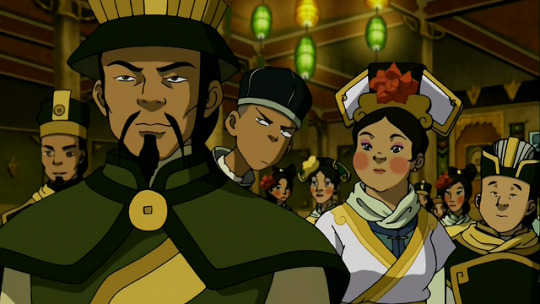
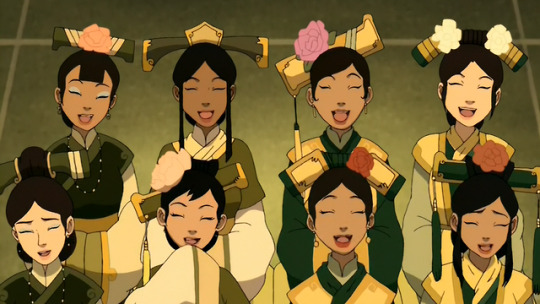
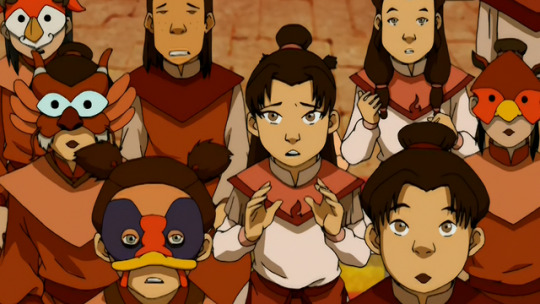


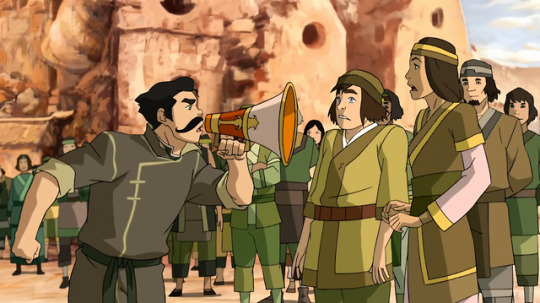

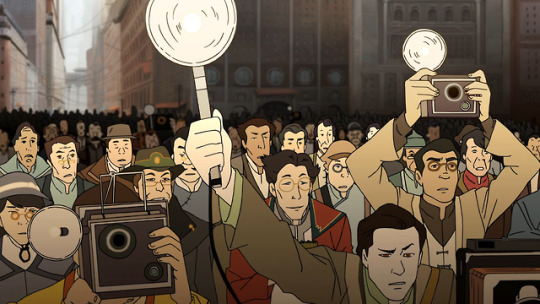
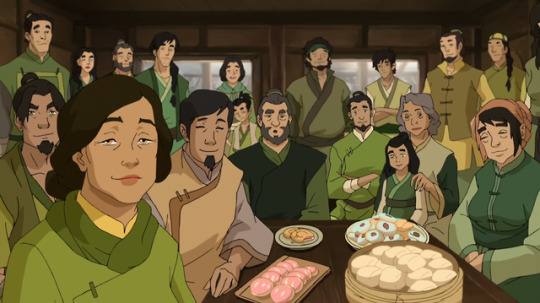

It still boggles my mind that after all these years, some people are still so insistent that characters in ATLA and TLOK are not meant to be Asian because....”they don’t look Asian.”
(Yes, I know the Water Tribes are primarily based on Native Americans/Inuits/Polynesians)
Ignoring the fact that this is a cartoon series where child characters are drawn with widely disproportionate facial features to denote their youth, how exactly are Asians supposed to look like?
Asia is vast and is probably the most diverse continent on Earth. Asians have distinct features based on different regions and there is no such thing as a uniform "Asian look." East Asians can be very pale, Southeast/South Asians can be dark/tanned, Central Asians can have "Western" facial features, and etc.
I'm Korean, and many Koreans have high cheek bones and strong jawlines, which many cite as "European features." Many of my family members from my mother's side have naturally round eyes. Even within the small confine of my country, the "average look" differs quite significantly by the region. Now imagine the whole continent.
Some people argue that since this is a fantasy world, that "Asians" don't exist.
Yes, they would be correct; there is no such race in the Avatar world. But this is clearly an Asian-influenced world...so why wouldn't the people living in it, who have Asian names, hairstyles, clothing, and customs, be also based on actual Asian people?
The show and its creators are all but shouting that at you; I honestly can’t fathom how people need to be convinced that people living in the Avatar world are intended to be Asian.
Circling back - Many of the main characters are drawn with almost disney-like eyes with unrealistic proportions (Mainly Aang, Katara, Toph, and Ty Lee). Just compare Toph or Katara with their parents and the difference becomes quite clear.
This is just an intentional aesthetic choice for younger characters (Large, round eyes = innocence). Even in anime, which ATLA's style is based on, actual Japanese characters are drawn in similar way.
Since child characters are drawn in a specific style, we really should be looking at the rest of their respective people rather than just characters themselves. Grown up versions of these characters seen in The Legend of Korra or any of the adult characters are drawn with realistic proportions.
(It's also worth nothing that many of the characters in ATLA and TLOK were designed/drawn by Korean artists)
It's my theory that most people who think these characters don't look Asian are westerners who have not spent much time around Asians and expect stereotypical hollywood caricatures.
Inb4 "AaNg Is WhItE" or “FiRe NaTiOn iS eUrOpE”
4K notes
·
View notes
Note
What do you think Henry VII remembers, if anything, of his other uncle Henry VI?
This is such an interesting question and something that I myself have been wondering, so thank you for providing me with the opportunity to expand my thoughts on here 🌹
We know that Henry VII only ever saw his uncle King Henry VI once during his life, when he was 13 years old. However, I’d argue King Henry must have caused quite a great impression on him, and considering Henry Tudor was old enough at that time, also a profoundly lasting one. So far young Henry Earl of Richmond had been living as a ward of his uncle Jasper’s enemies, the Herberts. By 1470 his old guardian, William Herbert, had been executed, and then, as the Earl of Warwick changed sides and brought about Henry VI’s readeption, Henry Tudor was returned to his uncle Jasper who took him to London to meet King Henry VI. That Jasper felt like acquainting his nephew with his brother denotes a special degree of closeness and advocates for his idea of family, in my opinion.
According to André, Henry VII’s court poet and self-styled regius historiographus, on 27 October 1470 Henry VI held ‘a splendid feast with the nobles and best men of the kingdom’ to commemorate his return to the throne. As the king was washing his hands, young Richmond was brought to his presence, and according to André, ‘the king prophesied that someday the boy would undertake the governance of the kingdom and would have all things under his own power.’ Polydore Vergil, a historian that began his service under Henry VII in 1506, wrote in his Three Books that in that 1470 meeting ‘the king... is reported to have said:’
“This truly, this is he unto whom both we and our adversaries must yield and give over the dominion.”
It seems not even Vergil lends much credence to this tale as expressed by his choice of words: reported to have said. As expected, this myth has largely been viewed as Tudor propaganda and indeed the episode has been immortalised in Shakespeare’s Henry VI part III. In the play, King Henry VI meets a toddler Henry Richmond (then escorted by Somerset), calls him ‘England’s hope’, and says Richmond was ‘Likely in time to bless a regal throne’. Given that King Henry VI had his own son Prince Edward as his heir at the time, it seems unlikely he would ever have said such a thing. However, if anything remotely close to that happened, then I agree with Leanda de Lisle in saying that it must have been King Henry VI taking Henry Tudor to be his own son Edward, who thanks to his imprisonment in the Tower he had not seen for five years (and would not ever see again). It’s absurdly sad to think King Henry VI would confound his nephew with his son but arguably also not out of the realm of possibility. We don’t know if Henry Tudor saw his uncle King Henry again, but it’s also not unlikely that he, his mother and uncle Jasper stayed at court for the feast of All Hallows’ (1 November) and All Souls’ Day (2 November).
If King Henry VI ever made such prophecy, wittingly or not, then it must have greatly impacted on Henry Tudor. Henry VII believed to have been chosen by God to, against all odds, become king of England. He once wrote about ‘the crown which it has pleased God to give us with the victory over our enemy at our first field’. Henry Tudor was reported to be very pious—he made pilgrimages to the shrine of St Thomas Becket at Canterbury every Easter, as well as frequent pilgrimages to the shrine of Our Lady of Walsingham and donations to the shrine of St Vincent Ferrer in Brittany. He also founded the cult of the Breton saint St Armel in England and boosted the teachings of St Francis by his patronage of the Franciscan order. He especially favoured the Observants (the Franciscans, also known as the Greyfriars), granting them annuities for the establishment of monasteries in England and abroad. It seems he also favoured staying at religious houses when travelling or going on progress around the kingdom.
Most importantly, Henry VII held a singular devotion to the Virgin Mary and his adoption of the red rose as his personal symbol—aside from dynastic reasons—had everything to do with the religious connotations of that flower. Henry VII could have associated himself with his uncle Henry VI by adopting his antelope badge, for example, but instead, he chose the five-petal flower associated with the Virgin Mary and the Passion of Christ. The Franciscans were noted for their devotion to the Passion, and Henry VII had come in contact with the Observants during his exile in Brittany. The rose had five petals like the five wounds of Christ—St Bernard of Clairvaux once stated: “As many wounds as there are on the Saviour’s body, so many roses are there! Look at His feet and His hands; do you not see roses?”
Forgive me for still going on a tangent about it, but Henry VII’s personal devotion to the Virgin Mary and the doctrine of her Immaculate Conception is exemplified in his Book of Hours, where a miniature shows a figure representing the king kneeling at a prayer desk before a vision of the Virgin as a baby held by her mother, St Anne (or, alternatively, The Virgin and the Child Jesus). His devotion to the Virgin was also highlighted in his rebuilding of the Lady Chapel (now Henry VII’s Chapel) at Westminster Abbey which I will return to in a moment.

I’m not sure but I think it was Vergil who reported Henry VII as having said that religion was his ‘continual refuge’ during exile. His piety has been largely attributed to the influence of his mother Margaret Beaufort, herself also a very pious woman. But given how many years—and formative years those were—they spent apart, I imagine that Henry must have looked up to someone closer to him at the time, namely his uncle Jasper Tudor. We know that after the death of Catherine of Valois Jasper and his brother Edmund were raised by nuns at Barking Abbey, and that then at some point they joined King Henry VI’s court. According to John Blacman, Henry VI’s biographer and chaplain writing in 1485:
[…] and like pains did [Henry VI] apply in the case of his half-brothers, the Lords Jasper and Edmund, in their boyhood and youth; providing for them most strict and safe guardianship, putting them under the care of virtuous and worthy priests, both for teaching and for right living and conversation, lest the untamed practices of youth should grow rank if they lacked any to prune them.
Blacman also claimed that the king personally protected his half-brothers from sexual temptation by keeping ‘careful watch through hidden windows of his chamber’ (yes, I know). Like his uncle King Henry VI, Henry VII would also set a court that ‘maintained the highest standards of sexual behaviour’. Indeed, Retha Warnicke made an extensive compilation of scandals during the first two Tudor reigns and not a single case of sexual misconduct was found to have taken place during Henry VII’s time, marking his court as a decidedly different one than Edward IV’s had been.
Going back to Henry VI’s supposed prophecy, his words surely must have acquired a great weight in Henry Tudor’s mind by 1483 when he made his bid to the English throne. By that time King Henry VI had become a popular saint in England and even though Edward IV had tried to have him modestly—and somewhat obscurely—buried in Chertsey Abbey, Surrey, people had started to flock to his grave. A peasant claimed that Henry VI helped him when he had a bean trapped in his ear, which only popped out after he prayed to the king. Painted images of King Henry VI began showing up in churches around the country, like this one at Barton in Norfolk:

One of King Henry VI’s most ardent devotees was Henry Tudor’s mother Margaret Beaufort (Jasper’s feelings towards the cult are unknown) who had met her kinsman when she was about nine years old. When King Henry VI allegedly offered her the option of remaining married to Suffolk’s son or be remarried to his brother Edmund, Margaret says St Nicholas came to her in a dream dressed as a bishop, telling her to choose Edmund. Again, if this story is true or not, we may never know, but Margaret told that to her confessor John (bishop, then saint) Fisher—why would a famously pious woman such as Margaret Beaufort lie to her own confessor, thus committing a sin? It might be that the events took a mystical turn in Margaret’s imagination as a young girl, but that she associated divine intervention to hers and her son’s fate, and likewise to King Henry VI’s proposal, is clear.
It seems Richard III tried to control King Henry VI’s ever-growing cult by moving Henry VI’s body from Chertsey Abbey to St George’s Chapel at Windsor, a place where visitors wouldn’t have easy access to the king. Nevertheless, when Henry VII came to the throne he wholeheartedly encouraged pilgrimages to the place. Henry VII launched an official campaign to have his uncle canonised, with several petitions to popes Innocent VIII, Alexander VI and Julius II. Henry also ordered the compilation of a book of miracles worked by his uncle, and a biography of Henry VI was published in 1500 claiming that Henry VI had been ever pious and chaste during his life, towards his queen never behaving ‘unseemly ... but with all conjugal honesty and gravity’. Henry VII planned to have the body of King Henry VI re-interred at the heart of the new Lady Chapel he was planning at Westminster Abbey.
However much Henry VII enjoyed good relations with the papacy, especially Pope Innocent VIII, his campaign to have his uncle King Henry VI canonised never came into fruition. Henry VII decided for him and his wife to be buried at his new Lady Chapel instead, next to the tomb of his grandmother Queen Catherine of Valois. In his will, he stated his wish for his body to be buried:
“in the Chapell where our said graunt Dame laye buried, the which Chapell we have begoune to buylde of newe, in the honour of our blessed Lady.”
That doesn’t mean Henry VII set aside the memory of his uncle King Henry VI. He employed the same man that was overseeing the construction of the Lady Chapel at Westminster, Reginald Bray, to continue the rebuilding of St George’s Chapel at Windsor set in motion by his predecessor Edward IV (it came to be informally known as the Bray Chapel). The modest thirteenth-century chapel of Edward the Confessor was expanded into a vast cathedral-like chapel where, importantly, Henry VI’s body was placed alongside a famous relic, the fragment of the True Cross (a reliquary known as the Cross of Gneth) and the bones of John Schorne (revered for curing gout and toothache).
We may argue that Henry VII’s campaign to have King Henry VI’s canonised was fundamentally political (much like Richard II’s campaign for Edward II) as many historians have done. King Henry VI as a saint, combined with his supposed prophecy, would successfully contribute to the image of Henry VII’s reign as one chosen by God. When we put Henry VII’s religious devotion into perspective, though, his efforts to have ‘the glorious King Henry’ canonised take another dimension—in fact, there’s no doubt that in Henry VII’s eyes God had intervened in his favour. Henry VII’s will also stated his wish for an image of himself to be placed in St Edward’s chapel at Westminster, depicting him returning to God and the Virgin Mary the circlet with which he had been crowned at the Battle of Bosworth.
This is me purely speculating, but I think that even though Henry VII only came in contact with King Henry VI once in his life, his half-uncle might have exercised a great influence on him through his uncle Jasper. Jasper seemed to have been genuinely attached to his brother Henry on a personal level as well as devoted to his political cause. If Henry VI’s saintly qualities had been enough to impress Margaret Beaufort, it is very likely that they might have impressed young Henry of Richmond as well.
48 notes
·
View notes
Text
The Delicate Balance...
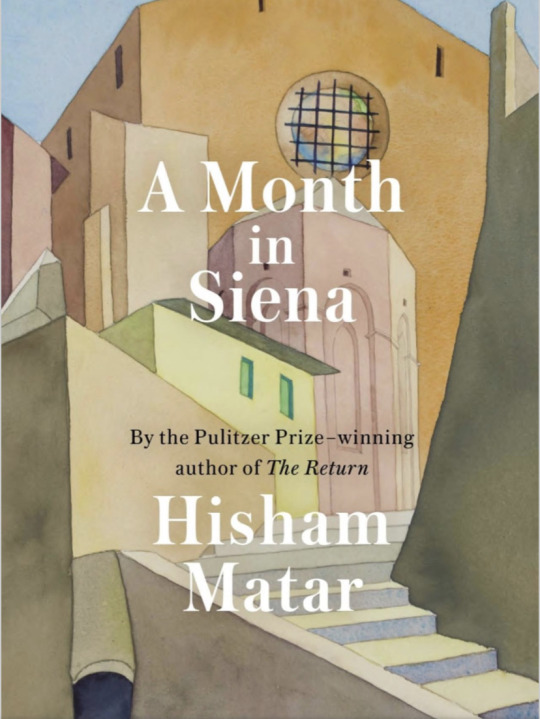
... if all one wants is to retire and be alone, what happens after attainment?
This week, through an intriguing book, I was challenged by what keeps a spirit alive and vibrant... the “mystery of the planned” and the danger of no plan being the end of the story.
I don’t know everything; I know very little; I know nothing... these declarative statements seem to denote three separate conditions of being that are “either, or.” However one sees these statements as separate or statements saying the same thing they must be a call to action for the individual making them. Attainment of these realizations with no further building upon them to follow this self awareness is an ending. A dismal contentment of a state of being with nothing beyond is finality. Is that acquiescence? Certainly, we must acquiesce this truth, but if we do no more than simply realize ... then there is no more; but to acquiesce and to desire more is the quest to know more thus be more and then to live ... vibrantly!
Much of this journey into the changing of my life from what was to what is dare not become a final marking. For the story to go forward, we must be consumed, driven to plan and move forward to what will be. No one way of living exists for all to follow, all of our paths are as unique as stars in the heavens; but putting all your eggs in the basket of “I got it,” is a precarious venture. Throughout this more than year long self discovery of a teacher embarking upon retirement, I’ve made the point numerous times that balance, like in all things, is the key to making this transition work. We have earned rest, respite, freedom from daily occupational stresses; but that cannot be all there is... there must be more to make these years an adventure.

Since, the Covid shutdown of schools in March of 2020, through the retirement decision of August 2020, to the now of April 26th, 2021... I’ve been on a book reading binge to go along with my painting, illustration, hiking, binges. Since March of 2020, I suppose I’ve read 35+ books, a little more than one every two weeks. Some of them are “stinkers,” others exciting and a few, personally challenging. During my weekly Amazon book shopping time, I came across a book that seemed would satiate my European wanderlust at present. An Amazon recommendation came across the homepage of a book written by Hisham Matar titled, A Month in Siena. Matar’s story of his obsession with the Sienese School of Painting from the high Middle Ages and his first visit to the ancient city in the region of Tuscany. His perspective on goals, desires, time has been a “viola” moment for me and hits the nail on the head of what I’ve been trying to write over this year. Matar has misgivings that the realization of this visit could be the end of a passion that has been an unrealized mystery for him. He carries this concern to many levels and different parts of his life where similarities are drawn to this lifelong desire to visit Siena and study paintings. Matar writes:
The historian’s temptation is to capture the uncertain past, to contain and divide it into chapters ... tell the story coherently...of it’s motives and outcomes. And we are, of course, ... the historians of our own lives. The future, on the other hand, provides endless opportunities for our predictions and fantasies. With it, we can indulge our optimism by planning the years ahead, as though time were a carpet one could roll out into the unknown. The past and the future stimulate our imagination [if we aren’t careful] the present overwhelms it.*
This quote at first glance seems to tell us that true exploration takes places everywhere but the now... this immediate moment. Oddly, Matar even remarks the fact that “living in the moment” is part and parcel of our modern language.**
But the present offers no options; it insists on our attention. ...the most casual turn, an innocent encounter—with a person, a book, a painting, a piece of (unexpected) news—or a mere thought passing through one’s head can leave one ever so slightly altered... By comparison, the past is more easily located... and the future...always seems distant. It is the guest who is forever not quite here yet.***
His observation seems to imply that we are perpetually at the mercy of the present... which is truth no doubt. The danger is to not have anything sought for beyond the attainment of now. I’ve retired, I checked off the “bucket list” [I cringe when I hear that term], I went to that ONE place... so that’s it! No, no, no.... that is the coffin closing shut, if there is no desire ... no gleeful apprehension of the mystery to come, then living in the moment is a torturous waiting for the light to fade.

This isn’t a state of mind to be feared only for the person retiring, but for anyone at any stage of life. Shakespeare from his play, “King John” presents a gloomy picture of a life with no passions to pursue, “Life is as tedious as a twice-told tale, vexing the dull ear of a drowsy man.” Matar’s words are the keys to unlocking a passionate, heady transition to the years of retirement or any stage of life . Even though we know what happens to the best laid plans of mice and men, to cease having a plan .. a dream is far worse. Basically, there must be something... many somethings to live for, if not excitement, vibrancy and even breathing may cease.
Matar elaborates further than that, beyond having a goal that perpetuates the thrill of life that we normally associate with youth and being young:
Desire ...dies the moment it achieves it’s end. What keeps our passion for anyone or anything alive is the promise of attainment. ...there is a contradiction between what desire wants-complete conquest and what it needs in order to continue to exist-mystery the unknowable. In evolutionary terms, failure is the prerequisite, frustration it’s generator.****
We must not limit ourselves at anytime in our lives; to do so puts us at risk at the condition Henry David Thoreau observes, “ The mass of men lead lives of quiet desperation.” Thoreau, Matar and other writers and philosophers go even further than just the need to keep numerous fires burning inside; but to have others bear witness to this process. We are social creatures with an innate desire to share, to validate what we hold dear. Matar describes a scene where he and his wife are lying down in a field of grass just outside Rome with her resting her head on his chest. He acknowledges they are looking in the same direction but may never see the same thing. This creates a connection to the world of souls that pass our way and adds to our need to seek out goals that a community of others struggle with in much the same way, but never the same. What we achieve, what we love is validated when shared.
Whatever it is that creates this elusive bond between strangers taking account of one another in a public space was present and, so although we had entered recess, a sort of giant pit like a lit up stage to be suspended to cross it is to take part in the centuries old choreography, one meant to remind all solitary beings that it was neither good nor possible to exist alone*****
The key that I drew forth for me through all of this is that we exist with elation as long as we seek and challenge ourselves and learn when young or retired. The effort is to be made but the forms it takes are infinite ... “Cogito, ergo sum” as Rene Descartes wrote. The seeking and the challenges are made more enriching when shared in the world of souls, who like us, need encouragement and validation. This piece is somewhat different than my other sage fragments of wisdom; but often we can obtain “eureka” for our seeking of purpose by coming into the realization that we all share that personal need and a communal need to bond.
Matar, Hisham; A Month in Siena; Random House/ Penguin Random House Publishing; UK London; 2019
*pg. 40
**IBID.
***IBID. pg. 41
****IBID. pg. 27
*****IBID. pg. 14
http://labibliotecacoffee.com/
https://www.instagram.com/avenue_speak/?hl=en
#retirement#coffetime#open mind#stress#change#teacher#education#europe#health#writing#social media#social circle#lifeisgood#life goes on#life lessons#i need friends#life hacks#lifeisbeautiful#travel well#road less traveled#traveling#travel#self actualization#self discovery#self improvement#self care#read in 2021#reading#cogito ergo sum#carpe deim
2 notes
·
View notes
Text
Of Flowers and Strawberries
Day 17, Baking is here! I hope you’ll enjoy it.
Ao3
This is Maribat -- don’t like; don’t read.
____
“Okay, we’re baking now, alright? I want to show you how to make my favourite pastries. Next time we’re making yours,” Marinette told Damian one day out of the blue. He’d spent half of the day avoiding his brothers’ calls and texts, and now that they had finally quit (though only for a while, he knew that for sure), he just wanted to lie on their bed and never get up again.
And his angel had then apparently gotten a different idea and decided that wasn’t going to happen.
“Alright, love. Let’s do this,” he replied sighing, though he couldn’t deny he had a smile on his face. After all, this was his love, and and he would do anything for her. “What are we doing?”
“Fraisier! It’s been ages since I last made it and then I got the genius idea of teaching you how to do it as well!” There was a gentle, yet so very excited smile on her face as she told him what she wanted done, and Damian had to admit, even though he’d known her for years now, her smile still lit up his entire world. He didn't know what he was going to do if he one day lost it.
Well, her face lit up when she smiled and it was her that was his world, but he wasn’t going to tell her that. At least, not yet.
“Well, lead the way. Show me how this favourite of yours is done.”
Marinette walked — no, skipped — to the kitchen, dragging Damian with her by his hand. Once he might have minded it, but now? No. Now he simply smiled and wished this would never end.
“Can you please get us a pot and something to mix the ingredients with? Oh, and the milk. I’ll go find the kirsch and vanilla beans. Also, could you combine the eggs, egg yolks and sugar in a mixing bowl? I’d prefer to prepare the vanilla, and besides, my wrist is kind of dead. I wouldn’t be able to do it very well right now,” she told him before she let go of his hand and went to search for the flavourings, leaving him to somehow survive on his own.
Well, he was not about to let his girlfriend down. He would do his best, if only to make sure he didn’t ruin her favourite pastry.
When he finally thought he was done whisking them, Marinette dumped something that looked a lot like flour to the mix. “Cornstarch, keep mixing them,” she’d given her explanation before going back to what she herself was doing. Damian looked at her, his desperation for her help obvious on his face, but his girlfriend just winked at him with that ever-present smile on her face. It was clear, he was left to fend for himself.
“Are you done soon? We have to mix the warm milk and the eggs together, mon cœur,” Marinette said from where she was still watching over the milk (even though she was also making the batter at the same time. Damian really had a tendency to forget this girl had woman had grown up in a boulangerie, she could do this with her eyes closed).
They combined the milk and the egg mixture, frustrating Damian when Marinette then poured the entire thing back into the saucepan. “Why couldn’t we just put the eggs there?”
Marinette rolled her eyes fondly and giggled. “It’s because we don’t want the eggs cooking and scrambling themselves ahead of time. This way we can prevent it.”
“Of course. I should’ve guessed.”
“And now you can keep whisking this one.”
“Why do I only get to whisk everything?”
“Because you’re so very good at it, mon cœur. That’s why. Or are you saying you can’t do it?”
He scowled and grabbed the whisk. “Of course I can do i— wait.”
She just grinned as she saw he realised she’d literally gotten him to do what she wanted by basically daring him, and Damian was both thoroughly impressed and offended. This woman was going to be the end of him one day for certain.
They mostly worked in silence aside from the few tips Marinette gave him every now and then after she finally bothered with finding a recipe for him to follow. They got the actual cake batter done soon and put into oven, and while the cake was baking, Marinette had them cut strawberries and roll the almond paste she had found somewhere. Damian had just blinked and then she’d somehow suddenly had it already. Oh well. After all, she was an angel, or at least his angel. Maybe she could just magic it into her hands.
Quite some time later, they were finally ready to assembly the cake. Marinette placed all they needed on the counter, and Damian wasn’t completely sure how all of this was supposed to make a nice cake like Damian knew Marinette would want it to be. He didn’t even know what any of this — except for the strawberries and almond paste — was supposed to taste like as Marinette had forbidden him from eating anything.
Until now, anyway.
“Open wide, you can now taste this!”, she exclaimed, holding up a spoon full of yellowish cream. He distantly recognised it as the thing they had first done. He obediently opened his mouth and Marinette fed him the spoonful. It was perhaps a little too sweet to his tastes, but at least he got a great idea for teasing from it.
“It’s good, though a little too sweet—”
“It’s supposed to be sweet, Dames.”
“But, it’s still not as sweet as you.”
Mari looked at him with eyes wide before she squealed and hid her face from him. “ God , you always make me blush so much”, she mumbled, keeping her face buried behind her hands.
Damian laughed and wrapped his arms around her shoulders, slowly peeling her hands off her face. As he finally got to see her expression, he smirked and kissed her temple. “Aw, you’re blushing like a rose, habibti. You’re so adorable.”
“I— You— Damn you, Dames. We need to do the rest of this before you kill me by complimenting me too much.”
They lined up the strawberries around the edges of the cake tin and then put a lot of filling there, covering both the first layer of the cake and the strawberries. Then another layer of strawberries, cake and yet more filling.
He watched his girlfriend with a genuine smile on his face as Marinette wiped her forehead with her wrist, content with their work up until that point. It was just then as she looked up, going red once again as she saw his expression. “Can please flowers you get— I mean, could get-you the flowers please— Argh can you please go get the sugar flowers I made earlier?”
“Of course, habibti, anything for you.” He stayed there, still a gentle smile on his face, though, waiting to see her reaction.
“I— Damian, you— You jerk! Quit smiling at me! You know I can’t stop messing up my sentences when you look at me like that!”
He just laughed at her before he went to get the flowers from the other counter top. The flowers were white and a little sparkly as there was edible glitter on them. Damian smiled looking at them and glanced over to where he remembered Marinette had once been, all of her concentration focused on placing the almond paste upon the cake.
Now Damian arranged the white sugar flowers upon the cake. They reminded him of the white lilies and carnations he had gotten for her funeral. He had made sure he knew how to bake fraisier for her funeral, as it had been her favourite those few years he still had left with her. If he could do nothing else to honour her as he had failed to protect her, he needed to at the very least bake her favourite to the last place where they would be present at the same time.
There was a bouquet of crimson, pink and white roses on the table in a vase, and a single pink carnation lay next to them. The flower he had decided to get later, deciding he needed to have that in her bouquet as well.
And, beside them, there was a small box containing a sapphire ring with a double halo, never been worn by anyone, and it was never going to be found in anyone’s finger either.
Damian had never gotten the chance to propose, and now it was too late.
____
Lilies represent the restored innocence of the soul of the departed, white carnations convey pure love and innocence, crimson roses denote grief and sorrow, pink roses signify love, grace and gentility, white roses express reverence, innocence and youthfulness, pink carnations stand for remembrance. So yeah. Uh. Sorry? Feel free to yell at me if I hurt your feelings. I did say that this was fluff and angst so like,,,, but yeah you can scream at me if you want to.
_____
@ladysblackcat @daminett4life @tinyterror333 @annabellabrookes @7-sage-7 @theyellowfeverexperience @thethirdwheelfriend @lady-phoenix-of-tardis @kris-pines04 @daminette-december2019 @bluerosette23
#daminette#maridami#damian x marinette#Daminette december#maribat#marinette dupain cheng#Damian Wayne#miraculous ladybug#dc#ml x dc#ml#fanfiction#fanfic#ethel's writing
130 notes
·
View notes
Text
Dawnbringer update!!! 2 CHAPTERS!!!!!!!!!!!!!!!
Chapter 32
By all accounts
There are few accounts of the now infamous "Battle of Barrowdale", as it has come to be called, even fewer that do not conflict with one another. Even sources that were there cannot seem to agree on certain facts, but one thing remains certain, the people of Barrowdale fought tooth and nail to protect their homes and dignity from the wretch known as the "Thief King".
Some accounts claim it rained all day, some say it snowed, some reports claim the Thief King had hundreds of men others claim it was merely dozens. There are accounts that say the townsfolk were reduced to throwing roof tiles and rocks, some that they threw bombs and filled the skies with arrows.
The singular remaining fact that stays consistent in all accounts is the valor of the Dawnbringer and his companions. It is said his mage sister hurled bolts of fury from the heavens and when those were spent she fought like a warrior queen. The Sheriff of Barrowdale was said to be stout, resolute, and tireless in his efforts to keep pace with the legend fighting alongside him. The famous Dawnbringer is described as he had been for years; fearless, implacable, and relentless - fighting unlike any knight or legionnaire, instead showing his true nature; not a warrior, a killer, or back alley scrapper, but as a true soldier, a defender of his fellow man.
No doubt he looked the part, for tales told of a man wielding a glowing sword whilst clad in a legionnaire's armor. It's unclear how he had attained such finery seeing as how his own had been destroyed before his desertion, that and the fact that this particular suit carried a quite conspicuous crest on it's helmet, denoting it's wearer as a distinguished officer.
No doubt the Dawnbringer earned his armor that day. They all did.
Despite all their heroism and bravery however, by the battles end, the Thief King had played one final unscrupulous trick.
Chapter 33
Muck
Amidst the muck churned up by the rain, one could hardly find any solid footing. Sinking in up to his ankles Jared trudged toward the thief king and his rabble. All of them with blades drawn - weapons at the ready. He had stopped counting by the seventh brigand. A week ago he wouldn’t have taken those odds, or maybe he would have depending on the amount of mead.
What kind of man are you going to be? His father's voice asked, echoing in his mind.
With every step, the answer became more and more clear. Sometimes being a hero wasn't enough - sometimes you needed to let the monsters out. That’s exactly what he would have done. He would have visited every kind of hell imaginable on them. Torn them apart. Cut, gouged, and smashed until there were just red stains. But that wasn’t the case today. The acid in his blood, the fire in his bones, it simply wasn’t there. Now there was only peace.
For the first time in he didn't know how long his sword hand was steady. Slowly it gripped the hilt, fingers wrapping tightly around the dark and supple leather. For the first time in he didn't know how long, he wasn't afraid.
He couldn't afford to be. They needed him to be brave so he would be. He'd forgotten the feeling. The feeling that came with being “heroic”.
It's not about you. Lyra's voice croaked.
Warrior or soldier? The old man asked.
You were always taking the hits for someone else. His sister sighed.
"Let her go." The Dawnbringer said, almost in a whisper, yet somehow all could hear it over the pattering rain.
“I can’t do that.” the dead eyed youth replied. His knife at the young girls throat. “I’m responsible for them… I gotta keep them fed.” Those words rang through Jared’s head. They were words he’d said many times in another life.
Lowering the point of his sword Jared’s resolve faltered for a moment. There was something familiar about this boy king. Something that tugged at his memory. It reminded him of a scrawny underfoot pickpocket that used to pester him all day.
“Finn?” Jared asked, hoping he was wrong.
Something in the boys eyes changed, They went soft for half a heartbeat.
“Boss?” They boy asked in a hoarse whisper.
"Wh - what are you doing?" Jared asked in disbelief.
"I'm doing my job…" the young king replied. "They rely on me. You would've done the same."
"Finn… you're hurting people. That's not what I taught you."
"You taught me how to survive. Came in handy after you abandoned us." The boy paused, a sense of pain in his voice. "After you left, it went back to the way it used to be. The beatings, the abuse, the hunger… We needed someone to protect us and where were you?"
The cracking of the boys voice as he held back tears - it broke his heart. But what truly shattered it was that he was right.
It'sssssss your faaault. The voice whispered. Coward. False hero...Failure.
Tears began to flow from Jared's eyes, hiding in the rain that was drenching them all. The slab of guilt slowly sliding down his throat. Swallowing it, he replied to his former ward.
"You're right… I should have been there." Jared said solemnly. "I was supposed to protect you and I failed."
A confused look spread across the thief king's face, as if he hadn't expected that reply from Jared.
"You were Red Jared!" Finn shouted.
A murmur spread throughout the rabble. Some voiced disbelief others too young to have been there, confusion.
"No one in the burrough crossed you… you were a beast. They said a whole generation walked with a limp because of you - and now?"
Jared lowered his head, not knowing the words that could explain what he had been. That a lion doesn't roar for the pleasure of it, but to keep the other, worse, beasts at bay. He tried with all his might to speak like a father, like a good father.
"I know you're angry. And I know you think what you're doing is right. But this isn't you… you're a good boy Finn."
"Angry?" He asked incredulously, as if he were offended by the notion. "This has nothing to do with anger, this is business."
"Finn. Don't. Don't make me do this." Jared begged, his voice cracking.
"I gotta keep them fed." He replied coldly. As the two kept their gazes fixed on one another Skye began slowly lifting the crystal, the knife still at her throat, her eyes screaming what she needed Jared to do.
With a sigh Jared simply repeated his plea, "Finn…"
"Another word - and I cut her throat." The king snarled.
Skye clenched her jaw struggling against his grip.
With a horrible sense of purpose, he clenched his eyes and slowly drew the sword, his sword from its sheath - its light shining like the moon. Its runes and wards once again seeing the light of day after having been stifled in darkness for so long. Its edge, keen and hard, unchipped and unmarked - beautiful and deadly as the day it was made.
In its day that sword had been swung with every intention the human heart can know save one. It had known hate, anger, and bloodlust. It had been used to protect the innocent and punish the wicked. To kill and to save. But today it had to do something terrible.
All across the throng of bandits as well as the townsfolk prepared to battle them, gasps could be heard as well as hushed voices whispering,
"The Dawnbringer… It's him, The Dawnbringer?...He's The sword… Gods... The arm… I thought he'd be taller."
"So that's why you left." Finn said almost defeated. As if he'd been robbed of his moral victory.
"No." Jared replied solemnly. "I left to kill the son of a bitch that took her from me. I fought armies and monsters, crossed half the world, and bled in the mud. I lost one family after another, all to get to him…I can't let you hurt her." Pausing to raise the point of the sword at the thief king Jared continued. "I'm only gonna ask one more time Finn. Let. Her. Go."
A grim resolve had taken hold of him now. Words had failed him, of course they had he wasn't a diplomat, steel however, that was far more reliable. He'd given them a chance. He'd given Finn a chance. A choice. Whatever happened next, was their decision.
After a long silence the thief King made his reply, his heart poisoned with years of hate. "Fuck you." He spat.
With tears in his eyes Jared swung the ancient blade.
@emdop @create-and-procrastinate just so ya’ll know I’m not dead lol
#writing#mywriting#mystories#fiction#fantasy#battles#swords#thieves#brigands#fights#armor#knights#brawls#Jared#Skye#Jak#Finn#Dawnbringer#WriteAwayJake#!!!
5 notes
·
View notes
Text
‘Made In Heaven’ Style: A Royal Affair

Unlike last episode, this episode was full of colors and motifs, after all, one gotta live up to the title, right? Get ready with your margarita (that’s how I imagine what you guys probably look like while reading these posts), to decode these scandalous royal lives.

Our leading lady’s first look of the episode works in two ways. The pale pink of the blouse helps her blend in enough with the crowd to look like she belongs there but the print and maroon trousers nicely makes her stand apart without being overtly obvious. Also, remember how in the second episode I brought attention to her maroon trousers in a scene where she’s first shown as being suspicious of Adil? Well, that’s a nice little hint there because...

...the next time we see her, we get to know that she in fact had a private investigator following Adil which in turn proves her suspicions about him probably continuing his affair with Faiza right. When she first found about their affair, she was in a white saree which I related to a mourning ensemble of sorts. This is the second time she found out about the affair and once again, she is in dull shades.

In the flashback, where by then Adil and Tara were already having an affair, we see Tara in work-appropriate ensemble, sure, but the stripes on her shirt sets her apart from the engaged couple who are in plain earthy tones. Now, even though the stripes are rather subtle, any kind of pattern in an otherwise plain setting denotes tension.

Taking a break from their personal lives, let’s talk about the royal bride and groom of the episode. My favorite thing to notice on all Indian TV shows and movies is how they portray royalty, particularly the women of North India, because more often than not, you’ll find that the costume designer pretty much always dresses them as Gayatri Devi used to dress up. Here too, Devyani is wearing light printed chiffon saree with pearl necklaces that not only suit the weather and give her a youthful appearance but also look darn elegant.

Meanwhile, MIH’s rival company Harmony is planning on using Karan’s sexuality into getting the next client who is a big politician. Mani is once again found in a patterned kurta with wide striped and dark colors, which perfectly captures the aggressive action she is plotting.

Those stripes are continued onto Tara in the next scene, but her aggression is for a different reason. Her mehendi girl, Pooja, is sexually assaulted and going by her reaction, she feels very strongly about catching the perpetrator who turns out to be the client. Tara and Pooja are literally in the same color; her’s is just more glamorous and modern version of that, giving her more agency as a character.

In the next scene, Tara is found talking (more like, arguing) to her mom and her irritation from the fact that Adil bought her a house is very visible. That irritation is coupled with her marriage problems which are always at the back of her head. Once again, her plaid skirt, another tension-creating pattern, denotes to the lack of peace of mind.

Blue is a color that is found in the corporate world, so it’s interesting to see that all the characters in the scene are in blue, like they are coming together for a business deal. Pooja is standing out because the light shade of her kurta speaks of her honest victim-hood, which contrasted with the other 3 characters who are in shades of dark blue, giving them an intimidating aura - like they are the ones with all the power and not the victim.

Jumping back to Tara’s personal life, this is the first time we see her among her regular social circle since the whole Faiza fiasco. By the looks of it, Tara was hoping nobody would even know, let alone get all up into her business, by pretending everything is fine and dandy which is shown through her dress choice - bright and colorful.

In the succeeding flashbacks, we get to know how Tara and Adil’s affair was revealed and how she was later on bribed by his father. In both the instances, she is wearing light pink shirts - a color that is synonymous with innocence and naivety - which works on two levels. Firstly, everyone in the office is judging her for the affair, so her walking in there looking all innocent comes across as rather deceiving on her part. Secondly, the color choice couldn’t be more ironic considering we later on get to know that she was the one who orchestrated this whole thing, so it’s pretty clear that she’s anything but naive.


For the wedding, there isn’t much to analyze on the bride’s part because the costumes are supposed to be traditional and decadent. But the angry green is continued on to Tara from when she originally came to know about the assault, showing just how frustrated she is with the pretentious family.

And while Devyani continues on with her Gayatri Devi drag, Tara is found once again in floral green blouse. Meanwhile, Karan is seen in a gray suit that matched his journalist friend who publicly ask them about the sexual assault, thereby bringing at least a little embarrassment to their family.
Only two episodes episodes to go, you guys! Thanks for bearing with me and my slow updates, I promise they’ll be up soon.
Pictures - Amazon Prime/Critic Corner
#made in heaven#fashion#Fashion Review#costume design#analysis#tv show#tv series#web series#sobhita dhulipala#kalki koechlin#bollywood#jim sarbh#arjun mathur#shivani raghuvanshi#style#Indian Fashion#traditional#wedding#lehenga#pantsuits
11 notes
·
View notes
Note
For DADWC: “You make me feel safe.” with the pairing of your choice!
First time writing these two!
Bethany/Sebastian, “You Make Me Feel Safe” (AO3)
It wasn’t until recently that waking up alone was a concerning experience for Sebastian.
In the grand scheme of things, even back in the hedonistic days of his youth, his nightly dalliances had been such frivolous and physical matters that it was more often than not that whoever he’d brought to his quarters would inevitably be gone, whether by their own volition or shooed away by his minders.
Of course, once his family had put up with that as much as they were able and shoved him into a chantry that had been the end of it, with the bland quarters afforded to the brothers not even so much as permitting the space even if his devotions to his vows started flagging, regardless of whether he was in Starkhaven or Kirkwall.
That had all changed when everything had burnt up in flames, starting with the Chantry, and it had become manifestly clear to Hawke and his companions that it was time to leave. Given the obvious evidence before his eyes, Hawke had seen fit to trust Sebastian with his sister, who was nothing better than a fugitive apostate after Meredith’s insane decision, and the two of them had left for Starkhaven. After yet more intrigues he had finally foiled the last of the Harimanns’ intrigues and reclaimed his title, gaining a dispensation from the Grand Cleric to marry her. That had been nothing short of a miracle, given that its notaries were a Chantry brother and a mage.
In essence, the problem here was that his wife, Lady Bethany of Starkhaven, was missing from their bed, divided as it was by a bolster sewn into the lining of the sheets.
Rolling over to the source of the chill wind blowing in, he found her standing on the balcony outside dressed only in her shift, staring out into the direction of the Vimmark Mountains. Blinking away his grogginess, he picked himself up off the bed, throwing on his robe and gently draping a blanket over Bethany’s shoulders like a mantle.
Gently hugging her from the side – Chantry vows thankfully were rather vague on the whole cuddling thing – he asked her, “What’s the problem, love?”
“Couldn’t sleep,” she muttered.
“Was it Meghan?” Sebastian asked, tilting his head to the other room.
“No, no,” Bethany said, shaking her head. “I think Goran and Flora are getting through to her, just a little bit.”
“I know you still find it rather unsettling,” he said, adding, “Maker knows I do. My dear cousin’s done a marvellous job as seneschal, and at least we’ll have staved off the-”
“The succession dispute, for another generation, yes,” Bethany said, cutting him short. “Yes, Seb, I know. I was there. We’ll have to raise her at some point, you understand, or we’ll be facing the same thing all over again if some other gang of schemers gets their hooks in her.”
“Like she was our own,” he said.
“Like our own…” Bethany echoed his words, trailing off as she mentally counted the peaks between the keep and horizon, her silence revealing many unsaid doubts and concerns.
Gently turning her to face him, he asked, “Are you…happy?”
Looking up at him with eyes reddened with sleeplessness and tears, she said collapsing into his chest, “Yes, Sebastian, I am. Given everything, there’s no other place I’d rather be.”
“And given…everything else?”
She was silent, simply pressing her cheek into his bare chest. “I don’t know, Sebastian. Things could have gone in so many other ways…every morning I wake up is a blessing, a reminder of how lucky we were to survive.”
He hugged her, clutching his wife tight to him. “The dawn will come.”
She nodded, her hair brushing against his chin. “The dawn will come.”
“If it wasn’t Meghan keeping you up, what was it then?” Sebastian asked Bethany as he released her.
“My brother.”
He paused, pressing on, “Hawke the Elder? What news is there?”
Wiping under her eyes, she explained. “A hooded courier arrived before we went to sleep. He’s involved in some very deep intrigue. It has to do with the Wardens.”
“The Wardens? Have they gotten involved in the matter of the Breach?”
“I think so,” she said, continuing, “He couldn’t say much at all save that he was writing from somewhere around the Exalted Plains. And he wroteabout…about our legacy.”
“Your…legacy?” Sebastian asked, confused.
“Corypheus.”
“Corypheus? The magister responsible for the Breach? How is he your ‘legacy’?”
A fresh wave of tears sparkling in her eyes, Bethany walked back to their bed, seemingly deflating as she sat down on its edge. “It’s a long story, and one before your time. Our father, Malcolm, was a Warden, and he used…blood magic…to seal Corypheus up in an ancient prison. But Corypheus, he was too powerful to bind, and he’d corrupted the Wardens, tricking them into breaking the seals many years later. Hawke though the’d settled the matter by slaying Corypheus. Evidently not.”
He gazed distractedly at the ground, muttering, “Evidently not.”
She looked up at him with imploring eyes. “Yes, our father was a maleficar. I’m so sorry, Sebastian. Please don’t-”
Cutting her pleading short, he sat by her, clutching her tight to him and kissing her on the cheek. “I never would. Those were the decisions, and the errors of the past. Your father’s mistakes, and those of the Wardens, are not yours, nor are they Hawke’s. In fact, I assume his actions now are aimed at rectifying those very mistakes.”
She nodded quietly, cleaning the fresh tears off the old ones, asking him, “When will we ever be free from the mistakes of our ancestors?”
“Never,” he said grimly. “That’s what history is.”
Bethany shuddered as she leaned into Sebastian, taking him by his arms. “I’m so scared, Sebastian.”
“Hush…” he whispered, stroking her hair.
“An ancient evil has torn the sky open in my homeland, and Hawke is right in the middle of the storm once again, and all because of our father’s decisions. They say he’s got an archdemon, Sebastian. We all fled to Kirkwall because of the last Blight. What if this is the next one? Where will we go? What will we do?”
“Further north, methinks. Maybe we’ll surprise the darkspawn by heading right into the Anderfels. They’ll never see it coming.”
She admitted herself a little smile. “I see the years with my brother have paid off, as far as developing a funny bone goes.”
“Hawke is good for the occasional thing, yes. As for us, Starkhaven’s walls are strong, its men and women stronger, and so long as I’m here, nothing save the Void itself would prevent me from defending us till the very end.”
Bethany hugged him, leading him down across the bed until they were laying their heads on the bolster that was supposed to denote, or at least signify, their vows. She leaned into him, pecking him on the lips in an innocent kiss.
“You make me feel safe, dear.”
“And you, my love. So long as we’re together.”
“Yes.” Pressing their foreheads together, she locked her gaze with his as a distant gurgle sounded. “Oh, I think that’s Meghan, seeing as you’re so concerned with her.”
“Heh,” Sebastian said, smiling. “I think Goran can handle her.”
“Why, is the brave holy warrior scared of a restless baby?”
“Absolutely terrified, my love. Thank Andraste I have you to keep me safe.”
Feet shuffled in the room over and a bottle of milk rattled as it was drawn from a cupboard kept next to the hearth. Meanwhile, in Sebastian and Bethany’s own chambers, the loving couple fell asleep in an embrace which might have tested the limits of their dispensation if anyone had bothered – or dared – to check in on them.
@dadrunkwriting
#bethany/sebastian#bethany hawke#sebastian vael#wilfred hawke#dragon age#dragon age inquisition#dragon age ii#ao3#fanfic#prompt fic#athenril-of-kirkwall#contreparry#dadrunkwriting#da drunk writing circle
9 notes
·
View notes